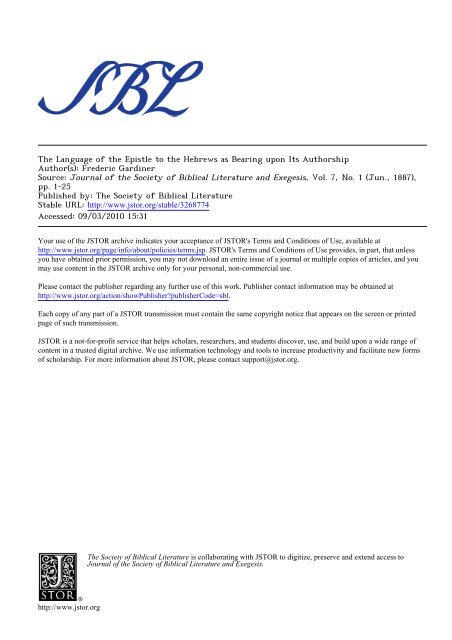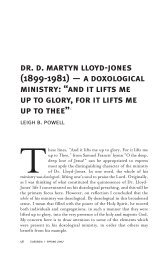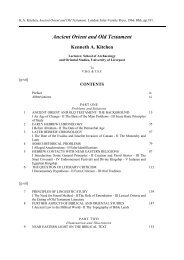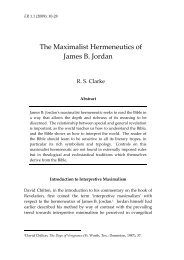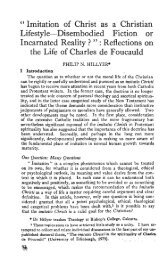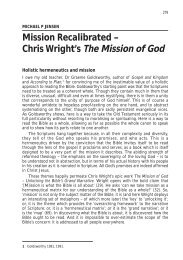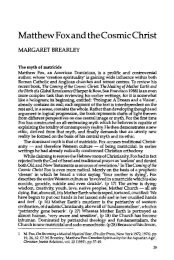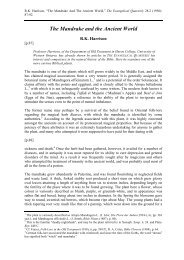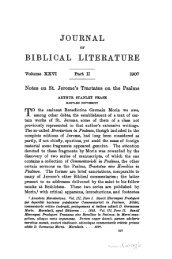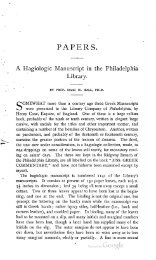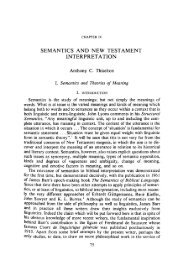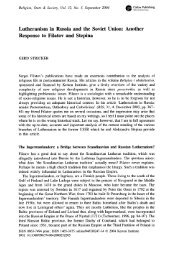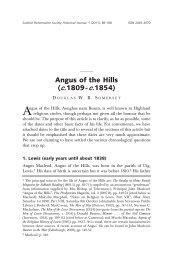The Language of the Epistle to the Hebrews as Bearing upon Its ...
The Language of the Epistle to the Hebrews as Bearing upon Its ...
The Language of the Epistle to the Hebrews as Bearing upon Its ...
Create successful ePaper yourself
Turn your PDF publications into a flip-book with our unique Google optimized e-Paper software.
<strong>The</strong> <strong>Language</strong> <strong>of</strong> <strong>the</strong> <strong>Epistle</strong> <strong>to</strong> <strong>the</strong> <strong>Hebrews</strong> <strong>as</strong> <strong>Bearing</strong> <strong>upon</strong> <strong>Its</strong> Authorship<br />
Author(s): Frederic Gardiner<br />
Source: Journal <strong>of</strong> <strong>the</strong> Society <strong>of</strong> Biblical Literature and Exegesis, Vol. 7, No. 1 (Jun., 1887),<br />
pp. 1-25<br />
Published by: <strong>The</strong> Society <strong>of</strong> Biblical Literature<br />
Stable URL: http://www.js<strong>to</strong>r.org/stable/3268774<br />
Accessed: 09/03/2010 15:31<br />
Your use <strong>of</strong> <strong>the</strong> JSTOR archive indicates your acceptance <strong>of</strong> JSTOR's Terms and Conditions <strong>of</strong> Use, available at<br />
http://www.js<strong>to</strong>r.org/page/info/about/policies/terms.jsp. JSTOR's Terms and Conditions <strong>of</strong> Use provides, in part, that unless<br />
you have obtained prior permission, you may not download an entire issue <strong>of</strong> a journal or multiple copies <strong>of</strong> articles, and you<br />
may use content in <strong>the</strong> JSTOR archive only for your personal, non-commercial use.<br />
Ple<strong>as</strong>e contact <strong>the</strong> publisher regarding any fur<strong>the</strong>r use <strong>of</strong> this work. Publisher contact information may be obtained at<br />
http://www.js<strong>to</strong>r.org/action/showPublisher?publisherCode=sbl.<br />
Each copy <strong>of</strong> any part <strong>of</strong> a JSTOR transmission must contain <strong>the</strong> same copyright notice that appears on <strong>the</strong> screen or printed<br />
page <strong>of</strong> such transmission.<br />
JSTOR is a not-for-pr<strong>of</strong>it service that helps scholars, researchers, and students discover, use, and build <strong>upon</strong> a wide range <strong>of</strong><br />
content in a trusted digital archive. We use information technology and <strong>to</strong>ols <strong>to</strong> incre<strong>as</strong>e productivity and facilitate new forms<br />
<strong>of</strong> scholarship. For more information about JSTOR, ple<strong>as</strong>e contact support@js<strong>to</strong>r.org.<br />
<strong>The</strong> Society <strong>of</strong> Biblical Literature is collaborating with JSTOR <strong>to</strong> digitize, preserve and extend access <strong>to</strong><br />
Journal <strong>of</strong> <strong>the</strong> Society <strong>of</strong> Biblical Literature and Exegesis.<br />
http://www.js<strong>to</strong>r.org
PAPERS.<br />
<strong>The</strong> <strong>Language</strong> <strong>of</strong> <strong>the</strong> <strong>Epistle</strong> <strong>to</strong> <strong>the</strong> <strong>Hebrews</strong><br />
<strong>as</strong> bearing <strong>upon</strong> its Authorship.<br />
BY PROF. FREDERIC GARDINER, D.D.<br />
THE following investigation w<strong>as</strong> originally entered <strong>upon</strong> without<br />
much hope <strong>of</strong> obtaining certain results, but yet with <strong>the</strong> desire<br />
<strong>to</strong> leave no s<strong>to</strong>ne unturned that might throw any light <strong>upon</strong> <strong>the</strong><br />
much-vexed question <strong>of</strong> <strong>the</strong> authorship <strong>of</strong> <strong>the</strong> Ep. <strong>to</strong> <strong>the</strong> Heb.<br />
Similar investigations have already been made by many, but it w<strong>as</strong><br />
preferred <strong>to</strong> undertake this independently. In <strong>the</strong> course <strong>of</strong> <strong>the</strong><br />
examination some points have been noted which seem worth record-<br />
ing, and even negative results have <strong>the</strong>ir value, sometimes affording<br />
a b<strong>as</strong>is for positive conclusions.<br />
It may be well <strong>to</strong> say at <strong>the</strong> outset, that it is not proposed here <strong>to</strong><br />
go over again <strong>the</strong> ground traversed by Delitzsch in his commentary<br />
on this epistle in comparing its phr<strong>as</strong>eology with that <strong>of</strong> S. Luke, nor<br />
yet that <strong>of</strong> Lunemann, controverting <strong>the</strong> opinions <strong>of</strong> Delitzsch, and<br />
himself contr<strong>as</strong>ting <strong>the</strong> style <strong>of</strong> <strong>Hebrews</strong> with that <strong>of</strong> S. Paul, in <strong>the</strong><br />
introduction <strong>to</strong> his commentary; but <strong>to</strong> make more <strong>of</strong> a purely verbal<br />
examination, although, <strong>of</strong> course, this must sometimes <strong>to</strong>uch <strong>upon</strong><br />
paths already trodden.<br />
In comparing <strong>the</strong> language <strong>of</strong> one book <strong>of</strong> <strong>the</strong> N. T. with that <strong>of</strong><br />
o<strong>the</strong>rs, <strong>the</strong> relative length <strong>of</strong> <strong>the</strong> different books must be kept in<br />
mind. <strong>The</strong> following table gives <strong>the</strong> number <strong>of</strong> lines in each <strong>of</strong> <strong>the</strong><br />
books <strong>as</strong> printed in Griesbach's manual edition <strong>of</strong> I805 :-<br />
Matt. 2285 2 Cor. 56I I Tim. 222 2 Pet. 151<br />
Mk. 14I9 Gal. 277 2 Tim. I64 I Jno. 244<br />
Lk. 2432 Eph. 305 Titus 92 2 Jno. 30<br />
Jno. I843 Phil. 202 Philemon 43 3 Jno. 29<br />
Acts 2389 Col. I97 Heb. 656 Jude 67<br />
Rom. 88i I <strong>The</strong>ss. I89 J<strong>as</strong>. 221 Rev. II38<br />
i Cor. 846 2<strong>The</strong>ss. Ioo i Pet. 228
2<br />
JOURNAL OF THE EXEGETICAL SOCIETY.<br />
Or, grouping <strong>the</strong>se books according <strong>to</strong> <strong>the</strong>ir authors: Lk. 4821;<br />
Jno. 3284; Pauline, 4079; Heb. 656; all o<strong>the</strong>rs <strong>to</strong>ge<strong>the</strong>r, 4304.<br />
For <strong>the</strong> purposes <strong>of</strong> <strong>the</strong> present comparison this gives: Lk. 4821;<br />
Heb. 656; Pauline, 4079; all o<strong>the</strong>rs, 7588. Hence, <strong>to</strong> determine<br />
<strong>the</strong> relative frequency <strong>of</strong> any word, it is necessary <strong>to</strong> multiply <strong>the</strong><br />
number <strong>of</strong> its occurrences in S. Luke by 75 88= I.57; in Heb. by<br />
7' -,-f II.56; 77i8n<br />
Hb b<br />
758 8= in S. Paul by 79 = i.86. <strong>The</strong>re is, <strong>of</strong> course, a<br />
certain fallacy in this process. An author may use a word several<br />
times in a short writing which he would not have used again had <strong>the</strong><br />
writing been extended; or he may never use a word in twenty pages,<br />
when he will employ it several times in <strong>the</strong> twenty-first. Such facts<br />
must be borne in mind, but <strong>the</strong> above process seems <strong>to</strong> be <strong>the</strong> only<br />
means <strong>of</strong> making a comparative statement in figures. Throughout<br />
this paper, for convenience in using concordances, etc., I have taken<br />
<strong>the</strong> Text. Rec., <strong>as</strong> sufficiently accurate for <strong>the</strong> purpose, except where<br />
<strong>the</strong> contrary is expressly noted.<br />
One obvious means <strong>of</strong> estimating <strong>the</strong> comparative richness <strong>of</strong> <strong>the</strong><br />
vocabulary <strong>of</strong> a writer is by observing how many <strong>of</strong> his words are<br />
peculiar <strong>to</strong> himself. Peculiar words, indeed, are <strong>of</strong>ten required by<br />
peculiarity <strong>of</strong> subject, and may <strong>of</strong>ten be what is called accidental.<br />
Still, when <strong>the</strong> number <strong>of</strong> <strong>the</strong>m in any writer is unusually large, <strong>the</strong><br />
fact h<strong>as</strong> its value. Now if one examine <strong>the</strong> table <strong>of</strong> " Words peculiar<br />
<strong>to</strong> individual N.T. writers," given in Thayer's Grimm's N.T. Lexicon,'<br />
he will be struck with <strong>the</strong> fact that <strong>the</strong> writings <strong>of</strong> S. Luke and<br />
<strong>the</strong> Ep. <strong>to</strong> <strong>the</strong> Heb. abound in peculiar words above all o<strong>the</strong>rs.<br />
Excluding words occurring in quotations from <strong>the</strong> LXX (which have<br />
no bearing <strong>upon</strong> <strong>the</strong> characteristics <strong>of</strong> <strong>the</strong> writer), and also excluding<br />
words which depend on Var. Lect., we find that <strong>the</strong> number <strong>of</strong> such<br />
words in <strong>the</strong> Gospel <strong>of</strong> S. Luke is 249, in <strong>the</strong> Acts 414, in <strong>the</strong> Ep. <strong>to</strong><br />
<strong>the</strong> Heb. I47,2 while even <strong>the</strong> Apocalypse, with all its peculiar subjects<br />
and remarkable imagery, h<strong>as</strong> but Ii6, and none <strong>of</strong> <strong>the</strong> o<strong>the</strong>r<br />
books, except Matt. (II4), reach <strong>as</strong> high <strong>as</strong> Ioo. This fact suggests<br />
that <strong>the</strong> writer <strong>of</strong> Heb. w<strong>as</strong> distinguished, like S. Luke, from <strong>the</strong><br />
1 Appendix IV. pp. 698-710. I have preferred <strong>to</strong> take <strong>the</strong>se statistics from<br />
this accurate and scholarly work; <strong>the</strong>y vary only slightly from similar tables prepared<br />
by myself more than thirty years ago. In my own tables, however, I had<br />
noted whe<strong>the</strong>r, and how <strong>of</strong>ten, <strong>the</strong>se words occur in <strong>the</strong> LXX, and also certain<br />
o<strong>the</strong>r facts concerning <strong>the</strong>m, <strong>to</strong> some <strong>of</strong> which I may have occ<strong>as</strong>ion <strong>to</strong> refer.<br />
2 This number is incre<strong>as</strong>ed by some curious mistake <strong>to</strong> 217 in a note by <strong>the</strong><br />
late Dr. Ezra Abbot, generally so scrupulously exact, in Smith's Bible Dict. (Amer.<br />
ed.), p. 1025, note d.
LANGUAGE OF THE EPISTLE TO THE HEBREWS.<br />
3<br />
o<strong>the</strong>r N. T. writers by a peculiarly rich vocabulary; but <strong>as</strong> soon <strong>as</strong><br />
<strong>the</strong> comparative length <strong>of</strong> <strong>the</strong> books is taken in<strong>to</strong> consideration, <strong>the</strong><br />
suggestion falls <strong>to</strong> <strong>the</strong> ground. S. Luke's Gospel h<strong>as</strong> one peculiar<br />
word <strong>to</strong> every 9.76 lines, Acts one <strong>to</strong> 5.77, Heb. one <strong>to</strong> 4.45; but<br />
i Tim. h<strong>as</strong> one <strong>to</strong> every 3 lines, 2 Tim. one <strong>to</strong> 3.22, Titus one <strong>to</strong><br />
2.97, J<strong>as</strong>. one <strong>to</strong> 3.5, and so on with several <strong>of</strong> <strong>the</strong> o<strong>the</strong>r shorter<br />
epistles. In no book, however, <strong>of</strong> nearly equal or <strong>of</strong> greater length<br />
is <strong>the</strong> proportion so large <strong>as</strong> in <strong>the</strong> Heb. except in <strong>the</strong> Acts. So also<br />
if <strong>the</strong> whole writings <strong>of</strong> any author be taken. S. Luke in both his<br />
works <strong>to</strong>ge<strong>the</strong>r h<strong>as</strong> 724 words peculiar <strong>to</strong> himself, or one <strong>to</strong> every<br />
6.66 lines; S. John h<strong>as</strong> only 244, or one <strong>to</strong> I3.46 lines; S. Paul 777,<br />
or one <strong>to</strong> 5.25; Heb., <strong>as</strong> already said, one <strong>to</strong> every 4.45; while all<br />
<strong>the</strong> o<strong>the</strong>r writers added <strong>to</strong>ge<strong>the</strong>r have 378, or one <strong>to</strong> II.38. One<br />
general conclusion may be drawn from <strong>the</strong>se facts: that <strong>the</strong> results<br />
<strong>of</strong> statistics depend very much <strong>upon</strong> how <strong>the</strong>y are manipulated. Yet,<br />
on <strong>the</strong> whole, <strong>the</strong> first impression <strong>of</strong> every reader is confirmed,-<br />
that S. Luke and <strong>the</strong> author <strong>of</strong> Heb. excel <strong>the</strong> o<strong>the</strong>r N. T. writers in<br />
<strong>the</strong> richness <strong>of</strong> <strong>the</strong>ir vocabulary; but in view <strong>of</strong> <strong>the</strong> peculiar subjects<br />
treated in <strong>the</strong> epistle, it does not seem that this peculiarity is<br />
sufficiently marked <strong>to</strong> form <strong>the</strong> b<strong>as</strong>is <strong>of</strong> any important inference.<br />
<strong>The</strong> concordance may next be examined from ano<strong>the</strong>r point. May<br />
not some indication <strong>of</strong> authorship be found in <strong>the</strong> number and character<br />
<strong>of</strong> <strong>the</strong> words common only <strong>to</strong> S. Luke and Heb., <strong>to</strong> S. Paul and<br />
Heb., and <strong>to</strong> <strong>the</strong> o<strong>the</strong>r writers and Heb. respectively? First, in regard<br />
<strong>to</strong> number. <strong>The</strong>re are 34 words common <strong>to</strong> S. Luke and Heb.<br />
and found nowhere else; <strong>to</strong> S. Paul and Heb. 46; <strong>to</strong> all o<strong>the</strong>rs and<br />
Heb. 28. As <strong>the</strong> "o<strong>the</strong>r writers" contain nearly twice <strong>as</strong> much<br />
matter <strong>as</strong> ei<strong>the</strong>r S. Luke or S. Paul, it is evidently necessary <strong>to</strong> change<br />
<strong>the</strong>se numbers in proportion <strong>to</strong> <strong>the</strong> length <strong>of</strong> <strong>the</strong> writings <strong>to</strong> bring<br />
out <strong>the</strong> real state <strong>of</strong> <strong>the</strong> c<strong>as</strong>e. <strong>The</strong> relative numbers are <strong>as</strong> follows:<br />
common <strong>to</strong> Lk. and Heb. 53.5; <strong>to</strong> S. Paul and Heb. 85.56; <strong>to</strong> o<strong>the</strong>r<br />
writers and Heb., <strong>as</strong> before, 28; or nearly twice <strong>as</strong> many common <strong>to</strong><br />
Heb. with S. Luke, and more than three times <strong>as</strong> many with S. Paul<br />
<strong>as</strong> with o<strong>the</strong>r writers. This fact tends, <strong>of</strong> course, <strong>to</strong> connect this<br />
epistle with both S. Luke and S. Paul, but especially with <strong>the</strong> latter.<br />
It quite falls in with <strong>the</strong> vacillating opinion <strong>of</strong> Origen (notwithstanding<br />
his strong remarks on <strong>the</strong> difference <strong>of</strong> style between this epistle<br />
and <strong>the</strong> Pauline writings), and with <strong>the</strong> report he gives <strong>of</strong> <strong>the</strong> traditions<br />
current in his day, sometimes attributing it <strong>to</strong> S. Paul, while<br />
elsewhere he says, "<strong>the</strong> account that h<strong>as</strong> come down <strong>to</strong> us is various,<br />
some saying that Clement, who w<strong>as</strong> Bishop <strong>of</strong> Rome, wrote it; o<strong>the</strong>rs
4<br />
JOURNAL OF THE EXEGETICAL SOCIETY.<br />
that it w<strong>as</strong> Luke, who wrote <strong>the</strong> Gospel and <strong>the</strong> Acts." 1 It also helps<br />
<strong>to</strong> explain <strong>the</strong> statement <strong>of</strong> his predecessor, Clement, that "<strong>the</strong> Ep.<br />
<strong>to</strong> <strong>the</strong> Heb. w<strong>as</strong>, indeed, Paul's, but in <strong>the</strong> Hebrew language, <strong>as</strong> first<br />
written <strong>to</strong> <strong>the</strong> <strong>Hebrews</strong>; but Luke carefully translated it in<strong>to</strong> Greek<br />
and published it for <strong>the</strong> Greeks. On which account <strong>the</strong> same coloring<br />
<strong>of</strong> language is found in this epistle and in <strong>the</strong> Acts <strong>of</strong> <strong>the</strong> Apostles."<br />
2 We are not here concerned with <strong>the</strong> external testimony <strong>to</strong><br />
<strong>the</strong> authorship, nor with <strong>the</strong> manifest improbability that this epistle<br />
should be a translation; but <strong>the</strong>re w<strong>as</strong> certainly something in its<br />
language which <strong>as</strong>sociated <strong>the</strong> epistle in <strong>the</strong> minds <strong>of</strong> <strong>the</strong> Alexandrian<br />
scholars <strong>of</strong> <strong>the</strong> third century with <strong>the</strong> writings <strong>of</strong> S. Luke <strong>as</strong> well <strong>as</strong><br />
<strong>of</strong> S. Paul.<br />
But much more important than <strong>the</strong> mere numerical statement is<br />
<strong>the</strong> character <strong>of</strong> some <strong>of</strong> <strong>the</strong>se common words. In <strong>the</strong> large majority<br />
<strong>of</strong> <strong>the</strong>m, indeed, <strong>the</strong>re is nothing noticeable; for <strong>the</strong>y have nothing<br />
characteristic, and many are used but once by each <strong>of</strong> <strong>the</strong> writers,<br />
and that apparently without any special design. A few, however, are<br />
worthy <strong>of</strong> more consideration. <strong>The</strong> noun Kaaravrrafft and <strong>the</strong> verb<br />
KaTraTrav, which might be expected <strong>to</strong> be frequent enough, are used<br />
only in Lk. and Heb., <strong>the</strong> noun once in Lk., 8 times in Heb.; <strong>the</strong><br />
verb 11 times in Lk., 3 times in Heb.; or, <strong>to</strong>ge<strong>the</strong>r, 2 times and I<br />
times. <strong>The</strong> noun /E'roxo is used once in Lk., 5 times in Heb., and<br />
nowhere else; while <strong>the</strong> verb /ErE'XO is used 5 times by S. Paul,<br />
3 times in Heb., and by no o<strong>the</strong>r writer. LtariOe/at occurs 3 times in<br />
Lk., twice in Heb., and nowhere else. vmvrdwav is used 4 times in<br />
Lk., twice in Heb., and not elsewhere. <strong>The</strong> word for star in Greek<br />
writers h<strong>as</strong> ei<strong>the</strong>r form, aoTrpov or arTrjp, and both are common in <strong>the</strong><br />
LXX. <strong>The</strong> former is used exclusively by S. Luke (3 times), and also<br />
in Heb., where, however, it occurs but once; ao-rTrp, however, is ex-<br />
clusively used by all <strong>the</strong> o<strong>the</strong>r N. T. writers, by S. Paul 3 times, by<br />
o<strong>the</strong>rs 21 times. On <strong>the</strong> o<strong>the</strong>r hand, IvSetKVVlvu occurs twice in Heb.,<br />
9 times in S. Paul, and in no o<strong>the</strong>r writer. <strong>The</strong> verb EVcpeOr-TEo<br />
(occurring 3 times) is peculiar <strong>to</strong> Heb., <strong>as</strong> is also <strong>the</strong> adverb Ecapeo-reo,<br />
while <strong>the</strong> adjective evapeo-ros occurs once in Heb. and 7 times<br />
in S. Paul, being found nowhere else in <strong>the</strong> N.T. <strong>The</strong> striking adverb<br />
6ca'rrat, not found in any o<strong>the</strong>r N. T. writer, occurs 3 times in Heb.<br />
and twice in S. Paul. <strong>The</strong> verb XerovpyeCo with <strong>the</strong> nouns Xelrovpyla<br />
and XAtrovpyo' and <strong>the</strong> adjective XaErovpytKo, though common enough<br />
1 Origen, Hrom. in Hebr., preserved in Euseb. Eccl. Hist. vi. 25 ad finem.<br />
2 Clement Alex. Hypost. in Euseb. Eccl. Hist. vi. 14 prope initium.
LANGUAGE OF THE EPISTLE TO THE HEBREWS.<br />
5<br />
in <strong>the</strong> LXX, and apparently sufficiently <strong>of</strong>ten called for, are used in<br />
<strong>the</strong> N. T. only by S. Luke, S. Paul, and in Heb. <strong>The</strong> verb occurs<br />
only once in each <strong>of</strong> <strong>the</strong>m; Xa<strong>to</strong>vpyta is used once by S. Luke,<br />
3 times by S. Paul, and twice in Heb.; Xctrovpyos 3 times by S. Paul,<br />
twice in Heb.; while XELtOVPYtKOS occurs only once in <strong>the</strong> l<strong>as</strong>t;<br />
i.e. <strong>the</strong> whole group is used twice by S. Luke, 7 times by S. Paul, and<br />
6 times in Heb., and none <strong>of</strong> <strong>the</strong>m anywhere else. <strong>The</strong> much more<br />
important word /EotirrS is used only in S. Paul and Heb., 3 times in<br />
each. <strong>The</strong> same is true <strong>of</strong> 0/koXoyta, a word which might have been<br />
expected more frequently. <strong>The</strong>re seems <strong>to</strong> be nothing peculiar about<br />
<strong>the</strong> word ovet8Co-os found only in S. Paul (3 times), and in Heb.<br />
(twice). <strong>The</strong> words cratLS'a and 7raLt8vrs/ also occur only in <strong>the</strong>se<br />
writers, <strong>the</strong> former 4 times, <strong>the</strong> latter once in S. Paul; <strong>the</strong> former<br />
twice, <strong>the</strong> latter once in Heb. We are surprised <strong>to</strong> find such a word<br />
<strong>as</strong> i7rXqpo4opta only in <strong>the</strong>se writers, in each <strong>of</strong> <strong>the</strong>m twice. <strong>The</strong><br />
remarkable word vrroorra-ct,, afterwards in a different sense <strong>of</strong> so<br />
much importance <strong>the</strong>ologically, is also found only in <strong>the</strong>se writers,<br />
in S. Paul 3 times, in Heb. twice.<br />
Now this examination <strong>of</strong> common words h<strong>as</strong> some value, unless it<br />
can be, at le<strong>as</strong>t in some degree, paralleled by words common <strong>to</strong><br />
Heb. and <strong>the</strong> o<strong>the</strong>r N. T. writers. I do not find that it can be. On<br />
turning <strong>to</strong> <strong>the</strong> list I find but two words common only <strong>to</strong> any or <strong>to</strong> all<br />
<strong>of</strong> <strong>the</strong>m and <strong>to</strong> Heb., occurring more than once in each, and <strong>of</strong><br />
course a single occurrence <strong>of</strong> a word is <strong>of</strong> small value. One <strong>of</strong> <strong>the</strong>se<br />
is <strong>the</strong> purely accidental word 3i38o/xos, used twice in Heb. and 7 times<br />
elsewhere (5 times in Rev.), and <strong>the</strong> o<strong>the</strong>r is <strong>the</strong> more important<br />
word parrtLo-,rL' (always in <strong>the</strong> plural, = purifying ablutions) used<br />
twice by S. Mark and twice in Heb.<br />
Whatever value <strong>the</strong>re may be <strong>the</strong>refore in this examination <strong>of</strong><br />
common words is much incre<strong>as</strong>ed by <strong>the</strong> almost entire absence <strong>of</strong><br />
any such relation with <strong>the</strong> o<strong>the</strong>r N.T. writers. It seems <strong>to</strong> point,<br />
<strong>as</strong> far <strong>as</strong> it goes, <strong>to</strong> some sort <strong>of</strong> relation between <strong>the</strong> three writers<br />
S. Luke, S. Paul, and <strong>the</strong> author <strong>of</strong> Heb., and especially <strong>of</strong> <strong>the</strong><br />
two latter.<br />
We may now turn <strong>to</strong> o<strong>the</strong>r words <strong>of</strong> wider range which yet have<br />
something in <strong>the</strong>ir usage tending <strong>to</strong> show <strong>the</strong> style <strong>of</strong> <strong>the</strong> writer.<br />
<strong>The</strong> verb E'pXo/ma with its various compounds, abr'-, 7-r'-, e e t-, Ka'-,<br />
7rap'-, and ,rpoo-epXo/atc is naturally used more frequently in narrative.<br />
Making allowance for this, we are surprised at its relative frequency<br />
in Heb. and its infrequency in <strong>the</strong> Pauline epistles. <strong>The</strong> proportionate<br />
numbers are: Heb. 5I9; S. Luke, 656; S. Paul, I69; all o<strong>the</strong>rs, 708.
6<br />
JOURNAL OF THE EXEGETICAL SOCIETY.<br />
If <strong>the</strong> particular compound co-repXouati be taken by itself, <strong>the</strong> proportionate<br />
numbers are: Heb. I96; S. Luke, I33; S. Paul, 7; all<br />
o<strong>the</strong>rs, 91. It is relatively much more frequent in Heb. than anywhere<br />
else, it is common in S. Luke, but almost entirely avoided by<br />
S. Paul.<br />
Aa/,/3avo and its compounds 6rt-, and 7rapaXaaL3acvo have a similar<br />
variable usage. <strong>The</strong>y are also relatively much more frequent in Heb.<br />
than anywhere else, much less common in S. Luke, and still less so in<br />
S. Paul. <strong>The</strong> proportionate numbers are:--<br />
HEBREWS. S. LUKE. S. PAUL. ALL OTHERS.<br />
Xa,3advo . . . 196 80 6I 157<br />
E7rt- . . 34 19 4 4<br />
7rapa- . . 39 I 20 25<br />
Toge<strong>the</strong>r . . 369 Ioo 85 i86<br />
It is noticeable that S. Luke almost entirely avoids <strong>the</strong> compound<br />
with 7rapa, and S. Paul that with E7rt, while Heb. uses <strong>the</strong>m all with<br />
peculiar frequency.<br />
While S. Mat<strong>the</strong>w habitually designates heavenly things by <strong>the</strong><br />
genitive plural rOv oipavGv or by <strong>the</strong> dative ev ro7s ovpavots and is<br />
somewhat followed by o<strong>the</strong>r writers, Heb. and S. Paul employ <strong>the</strong>se<br />
forms very little, and are almost alone in availing <strong>the</strong>mselves <strong>of</strong> <strong>the</strong><br />
compound adjective Ecrovpav<strong>to</strong>s for <strong>the</strong> same purpose. S. Luke uses<br />
this word only once; Heb. 6 times; S. Paul, I2 times; all o<strong>the</strong>rs,<br />
twice. On <strong>the</strong> o<strong>the</strong>r hand <strong>the</strong> simple opaovtco is not used at all in<br />
Heb. and S. Paul, but occurs twice in S. Luke and 4 times elsewhere.<br />
<strong>The</strong> distinction between <strong>the</strong> words XaXeiv and XEyeLv is generally<br />
recognized, and both are common enough. <strong>The</strong> only point <strong>to</strong> be<br />
noted is <strong>the</strong>ir frequency relatively <strong>to</strong> each o<strong>the</strong>r. Heb. uses <strong>the</strong>m in<br />
<strong>the</strong> proportion <strong>of</strong> : 2; S. Paul, <strong>the</strong> same; S. Luke, : 3-; all o<strong>the</strong>rs,<br />
I:7, nearly. Heb. and S. Paul are alike, S. Luke varies from <strong>the</strong>m<br />
considerably, but far less than o<strong>the</strong>r writers.<br />
<strong>The</strong> adjective wuovos and its adverb io'vov are used in Heb. only<br />
3 times; by S. Luke, 7 ; S. Paul, 49; all o<strong>the</strong>rs, 44. <strong>The</strong> Hebraistic<br />
7rpoo-otrov, so very frequent in <strong>the</strong> LXX, curiously occurs 27 times in<br />
S. Luke; it is found in Heb. but once, while S. Paul uses it 27 times,<br />
and all o<strong>the</strong>rs 22 times. So also pO/ia is a common enough word;<br />
but in its Hebraistic sense, corresponding <strong>to</strong> 1" , a thing, <strong>the</strong><br />
subject matter <strong>of</strong> speech or command, its use is confined <strong>to</strong> S. Luke<br />
(8 times), and does not occur in Heb. or elsewhere. Both v7rapXwo
LANGUAGE OF THE EPISTLE TO THE HEBREWS.<br />
7<br />
and v'roo-rpewo are favorite words with S. Luke. <strong>The</strong> former occurs<br />
in his writings 34 times, is not found at all in Heb., is used by S. Paul<br />
i times, and only 4 times elsewhere; <strong>the</strong> latter is used by S. Luke<br />
31 times, and elsewhere is used only once in Heb., once by S. Paul,<br />
and once by S. Mark. On <strong>the</strong> o<strong>the</strong>r hand, KaTEpyCdOlOLa is a Pauline<br />
word (21 times), never used in Heb., and but 3 times elsewhere<br />
(J<strong>as</strong>. 2, Pet. i). <strong>The</strong> use <strong>of</strong> <strong>the</strong> comparatives Kpetlro-wv and 7rX<strong>to</strong>v<br />
with <strong>the</strong> superlative 7rX<strong>to</strong>-iros on <strong>the</strong> contrary is far more common in<br />
Heb. <strong>The</strong> comparative numbers are: for Kpetacawv Heb. I50;<br />
S. Luke, o; S. Paul, 7 (he also uses <strong>the</strong> adverb Kpeiacrov once); all<br />
o<strong>the</strong>rs, 2. For 7rXewv, 7rXeioros,<br />
Heb. 46; S. Luke, 42; S. Paul, 19;<br />
all o<strong>the</strong>rs, I 7.<br />
I do not recall any o<strong>the</strong>r words <strong>of</strong> this kind, <strong>the</strong> usage <strong>of</strong> which<br />
affects <strong>the</strong> point. <strong>The</strong> inferences <strong>to</strong> be drawn from this examination,<br />
if any, are somewhat contradic<strong>to</strong>ry. <strong>The</strong>y certainly do not point <strong>to</strong><br />
<strong>the</strong> authorship <strong>of</strong> this epistle by ei<strong>the</strong>r S. Luke or S. Paul <strong>as</strong> <strong>the</strong>y<br />
might be expected <strong>to</strong> do if such were <strong>the</strong> fact. <strong>The</strong>re are some<br />
striking similarities <strong>of</strong> diction; but <strong>the</strong> differences are at le<strong>as</strong>t quite<br />
<strong>as</strong> important.<br />
It is now time <strong>to</strong> consider those particles, adverbs, and prepositions<br />
which bring out <strong>the</strong> habits <strong>of</strong> expression <strong>of</strong> each writer. While it is<br />
not proposed <strong>to</strong> enter in<strong>to</strong> points <strong>of</strong> grammatical construction any<br />
far<strong>the</strong>r than <strong>the</strong>y are necessarily involved in <strong>the</strong> use <strong>of</strong> <strong>the</strong>se words;<br />
yet in considering <strong>the</strong>m, it is well <strong>to</strong> bear in mind that <strong>the</strong>re is a<br />
striking similarity <strong>of</strong> grammatical construction between S. Luke and<br />
<strong>the</strong> Ep. <strong>to</strong> <strong>the</strong> Heb. Every one in <strong>the</strong> study <strong>of</strong> <strong>the</strong> N. T. grammars<br />
must have observed how <strong>of</strong>ten reference is made <strong>to</strong> this fact. Buttmann,<br />
e.g. (? I30, p. I42),1 remarks in regard <strong>to</strong> a certain construction,<br />
" <strong>the</strong> language <strong>of</strong> <strong>the</strong> N. T. however, especially that <strong>of</strong> Luke and <strong>of</strong><br />
<strong>the</strong> Ep. <strong>to</strong> <strong>the</strong> Heb., is not so far removed from <strong>the</strong> ordinary Greek<br />
<strong>as</strong> not <strong>to</strong> avail itself <strong>of</strong> this advantage." Again, he speaks <strong>of</strong> ano<strong>the</strong>r<br />
cl<strong>as</strong>sical construction (? I44, p. 299) <strong>as</strong> having " in <strong>the</strong> N. T. in <strong>the</strong><br />
c<strong>as</strong>e <strong>of</strong> XavOdvetv and its <strong>as</strong>sociated verbs almost completely disappeared,<br />
only a few instances <strong>of</strong> it being adducible (almost exclusively<br />
from Luke and <strong>the</strong> Ep. <strong>to</strong> <strong>the</strong> Heb.)." Again, speaking<br />
<strong>of</strong> /uv ... 8e, he says, "In <strong>the</strong> use <strong>of</strong> <strong>the</strong>se two particles <strong>the</strong> N. T.<br />
writers, especially Luke, <strong>the</strong> author <strong>of</strong> <strong>the</strong> Ep. <strong>to</strong> <strong>the</strong> Heb., and<br />
Paul, are by no means unpractised." Similar observations are<br />
frequent. Delitzsch h<strong>as</strong> collected in his commentary on <strong>the</strong> epistle<br />
1 Buttmann's Gram. <strong>of</strong> N. T. Greek, translatedr etc., by J. H. Thayer.
8<br />
JOURNAL OF THE EXEGETICAL SOCIETY.<br />
all that need be said <strong>of</strong> such similarities. <strong>The</strong>y seem <strong>to</strong> show only<br />
that S. Luke and <strong>the</strong> author <strong>of</strong> our epistle agreed in using ra<strong>the</strong>r more<br />
cl<strong>as</strong>sical constructions than were generally common <strong>to</strong> <strong>the</strong> o<strong>the</strong>r N. T.<br />
writers; but <strong>as</strong> this might e<strong>as</strong>ily have been <strong>the</strong> c<strong>as</strong>e with many<br />
Christian writers <strong>of</strong> <strong>the</strong> Apos<strong>to</strong>lic age, <strong>the</strong>y do not point <strong>to</strong> an identity<br />
<strong>of</strong> <strong>the</strong> writers. What is needed for that purpose is individual<br />
idiosyncr<strong>as</strong>ies or differences, and such difference in <strong>the</strong> use <strong>of</strong> <strong>the</strong><br />
optative between S. Luke and Heb. h<strong>as</strong> been pointed out by Dr.<br />
Harman (this Journal, Dec. I886, p. io). <strong>The</strong> optative mood occurs<br />
66 times in <strong>the</strong> whole N. T. - 32 <strong>of</strong> <strong>the</strong>m in <strong>the</strong> Pauline writings; it<br />
occurs but once in Heb. It is almost always " used <strong>to</strong> express a wish<br />
or prayer except in <strong>the</strong> writings <strong>of</strong> Luke."<br />
<strong>The</strong> adversative aXXa is common enough everywhere, not even <strong>the</strong><br />
shortest epistle being without more than one instance <strong>of</strong> its use; but<br />
it is much less frequent in S. Luke and in Heb. than anywhere else.<br />
A table <strong>of</strong> <strong>the</strong> proportionate use <strong>of</strong> this and several o<strong>the</strong>r words is<br />
given below. 'AXXAXo)v, common enough elsewhere, is found but<br />
once in Heb. <strong>The</strong> particles av and Edv are so much confused in <strong>the</strong><br />
Var. Lerc. that <strong>the</strong>y may best be taken <strong>to</strong>ge<strong>the</strong>r, Edv /rj and eavrep,<br />
however, being noted separately. In <strong>the</strong> use <strong>of</strong> 8<strong>to</strong> Heb. nearly<br />
doubles <strong>the</strong> usage <strong>of</strong> S. Paul, but he uses it three times <strong>as</strong> <strong>of</strong>ten <strong>as</strong><br />
S. Luke, and S. Luke more than twice <strong>as</strong> <strong>of</strong>ten <strong>as</strong> <strong>the</strong> o<strong>the</strong>r writers.<br />
In <strong>the</strong> use <strong>of</strong> 8&ort <strong>the</strong>re is more uniformity between <strong>the</strong> three writers<br />
<strong>as</strong> distinguished from o<strong>the</strong>rs, though Heb. is still in advance.<br />
HEBREWS. S. LUKE.<br />
S. PAUL. ALL OTHERS.<br />
XXa. .... I85 Io7 255 246<br />
XXrAX<strong>to</strong>v . .. II 31 74 40<br />
av, Eav . .. 127 I46 II6 286<br />
Edv 1rj . . . - I 26 4I<br />
Eavrp. . . . 3<br />
8<strong>to</strong> ..... 104 19 56 8<br />
tTt . . . . 23 I2 I9 4<br />
<strong>The</strong>se words, <strong>as</strong> far <strong>as</strong> <strong>the</strong>ir indications go, on <strong>the</strong> whole point <strong>to</strong> a<br />
writer <strong>of</strong> Heb. different from any <strong>of</strong> <strong>the</strong> o<strong>the</strong>rs.<br />
In <strong>the</strong> use <strong>of</strong> <strong>the</strong> pronouns <strong>of</strong> <strong>the</strong> first and second person and <strong>of</strong><br />
both numbers S. Paul, <strong>as</strong> might be expected, is most abundant, but<br />
<strong>the</strong> author <strong>of</strong> Heb. is singularly shy <strong>of</strong> <strong>the</strong>m. He w<strong>as</strong> far less disposed<br />
than any o<strong>the</strong>r N. T. writer <strong>to</strong> bring forward <strong>the</strong> personality <strong>of</strong><br />
ei<strong>the</strong>r himself or his readers. This fact h<strong>as</strong> been noticed and an<br />
explanation <strong>of</strong>fered b<strong>as</strong>ed <strong>upon</strong> <strong>the</strong> character <strong>of</strong> <strong>the</strong> work <strong>as</strong> more <strong>of</strong>
LANGUAGE OF THE EPISTLE TO THE HEBREWS.<br />
9<br />
a treatise than <strong>of</strong> a personal epistle; but this explains <strong>to</strong>o much, since<br />
<strong>the</strong> personal pronouns, though relatively infrequent, are still very<br />
common. Moreover, <strong>the</strong>re is no apparent re<strong>as</strong>on why <strong>the</strong> characteristics<br />
<strong>of</strong> a treatise should be found in this epistle ra<strong>the</strong>r than, e.g., in<br />
that <strong>to</strong> <strong>the</strong> Romans (where <strong>the</strong>y occur with characteristic frequency),<br />
except in <strong>the</strong> preferences <strong>of</strong> <strong>the</strong> writers. <strong>The</strong> proportionate numbers<br />
are :<br />
HEBREWS. S. LUKE. S. PAUL. ALL OTHERS.<br />
First person. . 462 491 913 594<br />
Second person . 705 I 15 I58I 1318<br />
Toge<strong>the</strong>r . . 1I67 I6o6 2494 1912<br />
St. Paul, <strong>the</strong>n, uses <strong>the</strong>se pronouns <strong>to</strong>ge<strong>the</strong>r far <strong>of</strong>tener than o<strong>the</strong>rs,<br />
and particularly more than twice <strong>as</strong> <strong>of</strong>ten <strong>as</strong> <strong>the</strong> author <strong>of</strong> Heb., who,<br />
though making absolutely very frequent use <strong>of</strong> <strong>the</strong>m, yet relatively<br />
employs <strong>the</strong>m far less than any one else. <strong>The</strong> c<strong>as</strong>e <strong>of</strong> <strong>the</strong> third person<br />
is peculiar, since its frequent and redundant use is one <strong>of</strong> <strong>the</strong> marked<br />
characteristics <strong>of</strong> <strong>the</strong> N. T. diction; yet here, curiously, S. Paul is<br />
found <strong>to</strong> use it less than half <strong>as</strong> <strong>of</strong>ten <strong>as</strong> Heb. <strong>The</strong> same is true <strong>of</strong><br />
<strong>the</strong> demonstrative Kd
IO<br />
JOURNAL OF THE EXEGETICAL SOCIETY.<br />
<strong>Hebrews</strong> and S. Luke are not far apart in <strong>the</strong> use <strong>of</strong> aXXoS; S. Paul<br />
employs it <strong>of</strong>tener than both <strong>of</strong> <strong>the</strong>m <strong>to</strong>ge<strong>the</strong>r, and <strong>the</strong> o<strong>the</strong>r writers<br />
collectively more than twice <strong>as</strong> <strong>of</strong>ten <strong>as</strong> S. Paul. On <strong>the</strong> o<strong>the</strong>r hand<br />
rEpos is used with exactly <strong>the</strong> same frequency in S. Luke and S. Paul,<br />
less than one quarter <strong>as</strong> <strong>of</strong>ten in <strong>the</strong> o<strong>the</strong>r writers, but much more<br />
abundantly in Heb. than in any <strong>of</strong> <strong>the</strong>m. <strong>The</strong> interrogative rtS is<br />
used less than half <strong>as</strong> <strong>of</strong>ten in S. Paul <strong>as</strong> in Heb., and less than half<br />
<strong>as</strong> <strong>of</strong>ten in Heb. <strong>as</strong> in S. Luke, o<strong>the</strong>r writers on <strong>the</strong> average being<br />
intermediate between Heb. and S. Luke; while <strong>the</strong> indefinite rt is<br />
most common in S. Paul, nearly <strong>as</strong> much so in Heb., far less so in<br />
o<strong>the</strong>r writers, and le<strong>as</strong>t <strong>of</strong> all in S. Luke.<br />
Taking <strong>the</strong> words Ecao-ToS, ToLovrow, and TOotOVTOS, proportionate<br />
numbers are:- HEBREWS. S. LUKE. S. PAUL. ALL OTHERS.<br />
eKaoTOs . . . 58 25 90 19<br />
TOLOVTro . . . 58 I2 6I I5<br />
TOLOVTO~S . . 58 6 4 Io<br />
That is, <strong>the</strong>y are all used in Heb. with exactly <strong>the</strong> same frequency,<br />
while <strong>the</strong>y vary widely in <strong>the</strong> o<strong>the</strong>rs. In regard <strong>to</strong> <strong>the</strong> l<strong>as</strong>t <strong>the</strong> usage<br />
<strong>of</strong> both S. Luke and S. Paul is unlike that <strong>of</strong> <strong>the</strong> Heb., and <strong>the</strong> frequency<br />
<strong>of</strong> <strong>the</strong> o<strong>the</strong>r two is different in S. Luke from that in S. Paul.<br />
It seems unnecessary <strong>to</strong> make fur<strong>the</strong>r examination <strong>of</strong> words <strong>of</strong> this<br />
cl<strong>as</strong>s. <strong>The</strong>y show a marked individuality and difference in <strong>the</strong> usage<br />
<strong>of</strong> <strong>the</strong> several writers; and it is <strong>to</strong> be remembered that Heb., Acts,<br />
and <strong>the</strong> later epistles <strong>of</strong> S. Paul must have been written at no great<br />
interval <strong>of</strong> time apart.<br />
Let us now take <strong>the</strong> particle el with its various combinations El Kat,<br />
el p4l7, El, e / ', Etl p j TE, E'I Trp, wE TO), El rE, and el Ts. Only <strong>the</strong><br />
first two <strong>of</strong> <strong>the</strong>se combinations occur in <strong>Hebrews</strong> at all. <strong>The</strong> actual<br />
numbers are: - HEB REWS. S. LUKE. S. PAUL. ALL OTHERS.<br />
EL .<br />
EL Ka .<br />
(C firp . . .<br />
14 65 I25 II2<br />
I 3 i6 2<br />
I 13 28 51<br />
EX ,L7T i<br />
-- I 2 -<br />
e<br />
Trep . ? .<br />
EL et 7MR5 7(O . . .<br />
et T<br />
S<br />
El TLS . . o<br />
Total<br />
or, proportionately<br />
0<br />
0<br />
5 I<br />
- I 3<br />
- -- 53 2<br />
-<br />
5 32 20<br />
I6 93 270 I96<br />
185 146 402 I96
LANGUAGE OF THE EPISTLE TO THE HEBREWS.<br />
II<br />
S. Paul, <strong>the</strong>refore, greatly exceeds all o<strong>the</strong>rs in <strong>the</strong> use <strong>of</strong> <strong>the</strong>se<br />
particles, while <strong>the</strong> difference between <strong>the</strong> o<strong>the</strong>rs is not so great,<br />
although S. Luke is most sparing <strong>of</strong> all in <strong>the</strong>ir employment.<br />
Adverbs <strong>of</strong> space are very sparingly used by S. Paul, with an approach<br />
<strong>to</strong> equality between Heb. and S. Luke, but twice <strong>as</strong> <strong>of</strong>ten by o<strong>the</strong>r<br />
writers. For KEZ, OTrOV, OV, 710o, and Joe, taken <strong>to</strong>ge<strong>the</strong>r, <strong>the</strong> proportionate<br />
numbers are: Heb. 82; S. Luke, 93; S. Paul, 26; o<strong>the</strong>rs, I86.<br />
In <strong>the</strong> various particles and adverbs <strong>of</strong> negation I do not find on<br />
<strong>the</strong> whole any noticeable peculiarities, although /8ret'L and ju/7a8 occur<br />
each but once in Heb., while <strong>the</strong> former is common both in S. Luke<br />
(3I times) and S. Paul (33 times), <strong>as</strong> well <strong>as</strong> in o<strong>the</strong>r writers (22<br />
times), and <strong>the</strong> latter less frequent in S. Luke (i i times), and common<br />
in S. Paul (29 times) and o<strong>the</strong>r writers (21 times). But <strong>the</strong> word<br />
Xwopt' is used frequently enough in Heb. <strong>to</strong> be considered characteristic;<br />
far less by St. Paul; le<strong>as</strong>t <strong>of</strong> all by S. Luke. <strong>The</strong> proportionate<br />
numbers are: Heb. i50; S. Luke, i; S. Paul, 28; all o<strong>the</strong>rs, io.<br />
<strong>The</strong> particles u'ev and 8e have already been alluded <strong>to</strong>. <strong>The</strong>y<br />
would naturally be more common in narrative; but <strong>as</strong> between Heb.,<br />
S. Paul, and <strong>the</strong> o<strong>the</strong>r epistles, <strong>the</strong>y are relatively most frequent in<br />
Heb. <strong>The</strong> same thing is true <strong>of</strong> <strong>the</strong> conjunction re, which is more<br />
common in S. Luke and S. Paul than in o<strong>the</strong>r N. T. writers.<br />
HaXwv is comparatively rare in S. Luke, but equally common in<br />
Heb. and S. Paul. Proportionate numbers are: Heb. i 6; S. Luke,<br />
13; S. Paul, 16; all o<strong>the</strong>rs, 94.<br />
<strong>The</strong> use <strong>of</strong> ry is very rare in Heb., whe<strong>the</strong>r <strong>as</strong> a disjunctive conjunction<br />
or <strong>as</strong> a term <strong>of</strong> comparison. In <strong>the</strong> latter sense it occurs<br />
but once, and in <strong>the</strong> former only 4 times, two <strong>of</strong> which are in quotations<br />
from <strong>the</strong> LXX, and a third in a more than doubtful reading. In<br />
all <strong>the</strong> o<strong>the</strong>r N. T. writers it is very common, and most <strong>of</strong> all in S. Paul.<br />
In <strong>the</strong> use <strong>of</strong> 1xaXXov, however, though S. Paul still exceeds, Heb. most<br />
nearly approaches his usage. <strong>The</strong> causal conjunction &dret is far more<br />
frequent in Heb. than anywhere else. <strong>The</strong> proportionate numbers<br />
(including all instances <strong>of</strong> ' in Text Rec.) are :-<br />
HEBREWS. S. LUKE. S. PAUL. ALL OTHERS.<br />
rv . .... 58 127 2I9 132<br />
AaXXov . . . 69 20 87 20<br />
rrE . .. . 04 3 20 5<br />
Whe<strong>the</strong>r in its interrogative, or its o<strong>the</strong>r use, OriJ is almost wholly<br />
avoided in Heb., occurring but once (interrogatively), while it is<br />
common enough in S. Luke (27 times), S. Paul (40 times), and<br />
o<strong>the</strong>r writers (5 times).
12<br />
JOURNAL OF THE EXEGETICAL SOCIETY.<br />
Both 7'va and o'n are used very <strong>of</strong>ten by S. Paul and <strong>the</strong> o<strong>the</strong>r<br />
writers, and much more sparingly in Heb.; but S. Luke uses tva much<br />
less than half <strong>as</strong> <strong>of</strong>ten <strong>as</strong> Heb., while he employs o'rt much more than<br />
half <strong>as</strong> <strong>of</strong>ten again. <strong>The</strong> proportionate numbers are: -<br />
HEBREWS. S. LUKE. S. PAUL. ALL OTHERS.<br />
a ..... 231 0oo 379 339<br />
T . . .. 208 373 519 683<br />
<strong>The</strong> un-Attic particle KaO<strong>to</strong>% <strong>the</strong> adverbs ovro% (x, s, (e, rTrp, and <strong>the</strong><br />
conjuction o-rre, all especially appropriate <strong>to</strong> trains <strong>of</strong> re<strong>as</strong>oning, are<br />
very various in <strong>the</strong>ir usage by <strong>the</strong> different writers. Proportionate<br />
numbers are :<br />
HEBREWS. S. LUKE. S. PAUL. ALL OTHERS.<br />
KaOw6u .... 92 44 I43 58<br />
OVT(7 . . . . 04 78 125 77<br />
eC . . . . 23 28 - 14<br />
X7rep . ... 35 8 30 17<br />
WOr . . . . II 17 73 32<br />
<strong>The</strong> following table <strong>of</strong> <strong>the</strong> proportionate numbers <strong>of</strong> <strong>the</strong> prepositions<br />
shows that while Heb., S. Luke, and S. Paul all use <strong>the</strong>m considerably<br />
more freely than <strong>the</strong> o<strong>the</strong>r writers (S. Paul most freely <strong>of</strong> all) <strong>the</strong>re is<br />
considerable variation between <strong>the</strong>m in <strong>the</strong> employment <strong>of</strong> each<br />
particular preposition, one preferring a construction with one preposition<br />
and one with ano<strong>the</strong>r. <strong>The</strong>y are all used by all except that<br />
Heb. alone never employs o-vv unless in composition, while S. Luke<br />
uses it <strong>of</strong>tener than any one else.<br />
HEBREWS. S. LUKE. S. PAUL. ALL OTHERS.<br />
ao . . 266 366 201 I90<br />
8La . . . 301 I62 526 14I<br />
EK, ?* .. . 243 I49 391 354<br />
7Tt . . . .. 220 386 246 396<br />
KaTa .... 416 2I5 352 I05<br />
/ETCd . 266 203 I36 243<br />
?rapad . . . II6 99 74 88<br />
rEp .... 254 i65 95 I39<br />
7rpos .. . 220 474 268 250<br />
ovv .. . -- I8 71 12<br />
E . . . I39 24 I99 25<br />
VT7 . 104 124 132 67<br />
Total . . . 2545 2485 2691 20IO
LANGUAGE OF THE EPISTLE TO THE HEBREWS.<br />
I3<br />
It may be thought that all this tedious examination is not worth<br />
<strong>the</strong> trouble. It goes <strong>to</strong> show - what h<strong>as</strong> always been noticed by<br />
every reader - that <strong>the</strong> style <strong>of</strong> <strong>the</strong> epistle is unlike that <strong>of</strong> S. Paul;<br />
but if it also show, <strong>as</strong> it seems <strong>to</strong> do quite <strong>as</strong> clearly, that it is unlike<br />
that <strong>of</strong> S. Luke <strong>to</strong>o, something h<strong>as</strong> been gained. It makes it<br />
improbable, at le<strong>as</strong>t, that S. Luke wrote <strong>the</strong> epistle <strong>to</strong> give expression<br />
<strong>to</strong> <strong>the</strong> ide<strong>as</strong> and arguments <strong>of</strong> S. Paul.<br />
It remains now finally <strong>to</strong> examine words <strong>of</strong> ano<strong>the</strong>r cl<strong>as</strong>s. <strong>The</strong>re<br />
are many words and groups <strong>of</strong> words so peculiarly appropriated <strong>to</strong><br />
certain ide<strong>as</strong> or shades <strong>of</strong> thought, that <strong>the</strong> use or non-use <strong>of</strong> <strong>the</strong>m<br />
indicates pretty clearly <strong>the</strong> habitual thought <strong>of</strong> <strong>the</strong> writer. If he use<br />
<strong>the</strong>m habitually, <strong>the</strong> ph<strong>as</strong>e <strong>of</strong> truth which <strong>the</strong>y represent must have<br />
been one <strong>of</strong> its prominent <strong>as</strong>pects in his mind; or if he very seldom<br />
employ <strong>the</strong>m, <strong>the</strong>n that <strong>as</strong>pect <strong>of</strong> truth w<strong>as</strong> not <strong>the</strong> predominant one<br />
from his point <strong>of</strong> view. Such words or groups <strong>of</strong> words are <strong>of</strong> very<br />
different degrees <strong>of</strong> importance; but even those <strong>of</strong> inferior significance<br />
help <strong>to</strong> complete <strong>the</strong> picture <strong>of</strong> <strong>the</strong> writer's mental habits, and it is<br />
<strong>the</strong>refore well <strong>to</strong> examine all which are in any degree characteristic.<br />
<strong>The</strong> group aya-rdao, ayadrrJ, and aya7rrrog is noteworthy. <strong>The</strong>y are<br />
very common in <strong>the</strong> Pauline writings, but are rare both in S. Luke<br />
and in Heb. In fact only one <strong>of</strong> <strong>the</strong>m, ayai7ryro, occurs at all in <strong>the</strong><br />
Acts, and none <strong>of</strong> <strong>the</strong>m are ever used by S. Luke except in recording<br />
<strong>the</strong> words <strong>of</strong> o<strong>the</strong>rs. So also <strong>of</strong> <strong>the</strong> Heb. Of <strong>the</strong> 5 instances <strong>of</strong><br />
<strong>the</strong>ir use, two are in quotations from <strong>the</strong> LXX. <strong>The</strong>y are common<br />
enough in o<strong>the</strong>r writers, but are especial favorites <strong>of</strong> S. John. Of <strong>the</strong><br />
I54 instances in "o<strong>the</strong>r writers," 109 are in S. John, so that <strong>the</strong> words<br />
may be called Pauline and Johannean. <strong>The</strong>ir rarity in S. Luke and<br />
Heb. may be partly explained by <strong>the</strong> fact that aya,rr is an exclusively<br />
biblical word, and that ayaird-o also is used in a higher sense in <strong>the</strong><br />
sacred than in pr<strong>of</strong>ane writings. Still <strong>the</strong>y were common words in<br />
<strong>the</strong> Christian community, and <strong>the</strong>y mark a distinction in thought<br />
between S. Luke and Heb. on <strong>the</strong> one side, and S. Paul and <strong>the</strong><br />
rest <strong>of</strong> <strong>the</strong> N. T. on <strong>the</strong> o<strong>the</strong>r. <strong>The</strong> actual number <strong>of</strong> instances <strong>of</strong><br />
<strong>the</strong>ir use is: Heb., 5 times; S. Luke, 15; S. Paul, 35 ; all o<strong>the</strong>rs<br />
(Jno. I09), 154; but if we exclude from <strong>the</strong> enumeration all quotations<br />
from <strong>the</strong> LXX, and all record <strong>of</strong> <strong>the</strong> words <strong>of</strong> o<strong>the</strong>rs, <strong>the</strong><br />
numbers become: Heb. 3; S. Luke, o; S. Paul, I32; all o<strong>the</strong>rs<br />
(Jno. 43), 87. <strong>The</strong> comparison is <strong>to</strong>o obvious <strong>to</strong> call for proportionate<br />
numbers. As an appendix <strong>to</strong> this group it may be mentioned<br />
that LtXE'w never occurs in Heb., is used only twice by S. Luke, twice<br />
by S. Paul, and 21 times elsewhere, I5 <strong>of</strong> which are in S. John.
I4<br />
JOURNAL OF THE EXEGETICAL SOCIETY.<br />
<strong>The</strong> word a8cEXpo' is somewhat like <strong>the</strong> previous group in that it is<br />
used most frequently by S. Paul, and next <strong>to</strong> him by S. John; it is,<br />
however, also common enough both in S. Luke and Heb. Proportionate<br />
numbers are: Heb. II6; S. Luke, 126; S. Paul, 247; all<br />
o<strong>the</strong>rs (Jno. 93), ii6.<br />
A word especially appropriate <strong>to</strong> Heb., and one which might<br />
have been expected <strong>the</strong>re very <strong>of</strong>ten, aytaa/o-', occurs but once, while<br />
it is used 8 times by S. Paul, and is not found in <strong>the</strong> rest <strong>of</strong> <strong>the</strong> N. T.<br />
On <strong>the</strong> o<strong>the</strong>r hand a'tLa, which we might have expected frequently<br />
in S. Paul <strong>as</strong> well <strong>as</strong> in Heb., is very common in <strong>the</strong> latter and not at<br />
all so in <strong>the</strong> former. Proportionate numbers are: Heb. 231 times;<br />
S. Luke, 31; S. Paul, 24; all o<strong>the</strong>rs, 44. Here, from <strong>the</strong> nature <strong>of</strong><br />
<strong>the</strong> writings, we may not be surprised at <strong>the</strong> commonness <strong>of</strong> <strong>the</strong> word<br />
in Heb.; but its comparative rarity in S. Paul is remarkable. His subjects<br />
led <strong>to</strong> it, and had it come <strong>to</strong> his mind <strong>as</strong> readily <strong>as</strong> it did <strong>to</strong> that <strong>of</strong><br />
<strong>the</strong> author <strong>of</strong> Heb., it must have occurred in his writings much <strong>of</strong>tener.<br />
<strong>The</strong> group <strong>of</strong> words, aXrjOac, aXrXrj, , ArLv, aXr/60s, and &ArOevo,<br />
which we are accus<strong>to</strong>med <strong>to</strong> consider peculiarly Johannean, is also<br />
very frequent in S. Paul, but comparatively rare in S. Luke and Heb.<br />
<strong>The</strong> actual numbers are: Heb. 4 (ArlOLvo' 3 times, aXrjcEta once);<br />
S. Luke, I2 ; S. Paul, 55; all o<strong>the</strong>rs, II4 (<strong>of</strong> which S. John, 95).<br />
<strong>The</strong> word alro'oroXos is used but once in Heb., and that in reference<br />
<strong>to</strong> Christ, in which sense it is never used in <strong>the</strong> o<strong>the</strong>r epistles. On<br />
<strong>the</strong> o<strong>the</strong>r hand, it is found in its ordinary meaning 34 times in <strong>the</strong><br />
Pauline, and 4 times in <strong>the</strong> o<strong>the</strong>r epistles. This may be due in part<br />
<strong>to</strong> <strong>the</strong> anonymous character <strong>of</strong> <strong>the</strong> epistle.<br />
Of <strong>the</strong> group ao-OEvea, aOw, aov, ao'evryLa, and ao-Oevry, only two<br />
occur in Heb. - ao-cvEta (4 times) and (Io-EOcvy (once). <strong>The</strong> actual<br />
occurrences <strong>of</strong> <strong>the</strong> whole <strong>to</strong>ge<strong>the</strong>r are: Heb. 5 times; S. Luke, I5;<br />
S. Paul, 43; all o<strong>the</strong>rs, 21; or proportionately, Heb. 58; S. Luke, 23;<br />
S. Paul, 9o; all o<strong>the</strong>rs, 2I. This is evidently an especially Pauline<br />
cl<strong>as</strong>s <strong>of</strong> words.<br />
<strong>The</strong> words <strong>of</strong> opposite signification, /3f3atco, f3Ef/a<strong>to</strong>O, f^Ef/aOaat--<br />
very infrequent in <strong>the</strong> LXX -do not occur at all in S. Luke, and are<br />
relatively far more frequent in Heb. than anywhere else. <strong>The</strong> proportionate<br />
numbers are: Heb. 92 times; S. Luke, o; S. Paul, I5;<br />
eisewhere, 3. Evidently S. Paul preferred <strong>to</strong> dwell <strong>upon</strong> weakness,<br />
<strong>the</strong> author <strong>of</strong> Heb. <strong>upon</strong> strength.<br />
<strong>The</strong>re is a similar contr<strong>as</strong>t between <strong>the</strong> verb cX'rwgo and <strong>the</strong> noun<br />
eX7ris on <strong>the</strong> one hand, and <strong>the</strong> verb rrayyeXoukat and <strong>the</strong> noun<br />
frrayyeAta on <strong>the</strong> o<strong>the</strong>r. KXrpovolep'o, KXrqpov<strong>of</strong>lla, and KXrlpovo/jLo are<br />
most common in Heb. <strong>The</strong> proportionate numbers are:-
LANGUAGE OF THE EPISTLE TO THE HEBREWS.<br />
I5<br />
HEBREWS. S. LUKE.<br />
S. PAUL. ALL OTHERS.<br />
A7rTC(o and X7rrL . . 69 20 100 10<br />
rayyEoLuat and } 208<br />
I6<br />
57 9<br />
E7rayyEXAta .<br />
KXr,povoIjEW, KpXrV ovo0j, } I04 II 33 8<br />
KXcrpovo/Jos . ..<br />
Toge<strong>the</strong>r . . . 381 47 90o 27<br />
It is plain that while <strong>the</strong> author <strong>of</strong> Heb. dwelt much more <strong>upon</strong> <strong>the</strong><br />
brightness <strong>of</strong> <strong>the</strong> future than any o<strong>the</strong>r writer, he preferred <strong>to</strong> speak<br />
<strong>of</strong> it in <strong>the</strong> light <strong>of</strong> promise and <strong>of</strong> inheritance, while it rested in<br />
S. Paul's mind more <strong>as</strong> a hope. This is <strong>the</strong> more noteworthy because<br />
<strong>the</strong>.ide<strong>as</strong> <strong>of</strong> sonship and <strong>of</strong> adoption are very common in S. Paul.<br />
He alone uses <strong>the</strong> word v<strong>to</strong>Oeca 5 times.<br />
<strong>The</strong> words 7'epa and ro-yjpov are curiously infrequent in a writer<br />
<strong>of</strong> <strong>the</strong> present urgency <strong>of</strong> S. Paul, and are relatively most common in<br />
S. Luke and Heb., but most so in <strong>the</strong> l<strong>as</strong>t. In proportion <strong>the</strong><br />
numbers are: Heb. 278; S. Luke, 207; S. Paul, Ioo; all o<strong>the</strong>rs, I53.<br />
That is, Heb. uses <strong>the</strong>m nearly three times <strong>as</strong> <strong>of</strong>ten <strong>as</strong> S. Paul.<br />
<strong>The</strong> names for God and for our Lord are used by <strong>the</strong> various<br />
writers with much difference, and with an evident preference in each<br />
<strong>of</strong> <strong>the</strong>m for his own accus<strong>to</strong>med word. <strong>The</strong> proportionate numbers<br />
(which can take no note <strong>of</strong> periphr<strong>as</strong>es) are <strong>as</strong> follows :--<br />
HEBREWS. S. LUKE. S. PAUL. ALL OTHERS.<br />
0OS .... 774 463 ioi6 4I9<br />
Kv1p<strong>to</strong> ?.. I85 335 524 213<br />
'Ioo . . . 50 255 4?5 5I9<br />
Xptr7oS . . . 50 69 562 I02<br />
In all c<strong>as</strong>es S. Paul uses <strong>the</strong>se words most freely (about twice <strong>as</strong><br />
<strong>of</strong>ten <strong>as</strong> anybody else), except that in <strong>the</strong> c<strong>as</strong>e <strong>of</strong> 'Iro-rov he is<br />
exceeded by "o<strong>the</strong>r writers" <strong>as</strong> a result <strong>of</strong> <strong>the</strong> large amount <strong>of</strong><br />
narrative contained in <strong>the</strong>m. ?eos is used in Heb. next in frequency<br />
<strong>to</strong> S. Paul, but with a long interval between <strong>the</strong>m, and very much<br />
more <strong>of</strong>ten than elsewhere. Kvp<strong>to</strong>3 is used le<strong>as</strong>t frequently in Heb.,<br />
while 'Iro-ovs and Xpt-Tro are employed <strong>the</strong>re, one with exactly <strong>the</strong><br />
same frequency <strong>as</strong> <strong>the</strong> o<strong>the</strong>r, though S. Luke, S. Paul, and <strong>the</strong> o<strong>the</strong>r<br />
writers employ <strong>the</strong>m very unequally, one preferring one, and ano<strong>the</strong>r<br />
<strong>the</strong> o<strong>the</strong>r. <strong>The</strong> use <strong>of</strong> <strong>the</strong>se words is so much a matter <strong>of</strong> habit,<br />
habit alike <strong>of</strong> writing and <strong>of</strong> mode <strong>of</strong> thinking, that <strong>the</strong>se facts go far<br />
<strong>to</strong> differentiate <strong>the</strong> writers.
JOURNAL OF THE EXEGETICAL SOCIETY.<br />
Krpvyt/a, Krjpv$, and KVpV'o-cw are none <strong>of</strong> <strong>the</strong>m ever used in Heb.<br />
For <strong>the</strong> o<strong>the</strong>rs proportionate numbers are: S. Luke, 27 times; S. Paul,<br />
35; all o<strong>the</strong>rs, 20.<br />
<strong>The</strong> group KavXaoLat, KatvXrlaL, and Kav'XO'L-t is almost exclusively<br />
Pauline, occurring in his writings 58 times, while it is nearly absent<br />
from Heb., only KaVXrXJla being used, and that but once. <strong>The</strong>se words<br />
do not occur in <strong>the</strong> o<strong>the</strong>r N. T. writers except 3 times in J<strong>as</strong>. So<br />
also XoytfopatL and ,LaKpoOvl'a are especially Pauline. <strong>The</strong>y each<br />
occur only once in Heb. <strong>The</strong> first is found twice, <strong>the</strong> second not at<br />
all in S. Luke; but Xoytioulat occurs 34 times in S. Paul, 4 times in<br />
o<strong>the</strong>r writers, while pLaKpoOvJUta is used by S. Paul io times, and only<br />
3 times elsewhere.<br />
- MavaOdv is used I6 times by S. Paul, only once each by Heb. and<br />
S. Luke, and 7 times elsewhere. IIapaKaXE'w and 7rapa,KXrlo-'t are much<br />
more frequent in S. Paul's writings than elsewhere, but in this c<strong>as</strong>e he<br />
is more nearly approached by Heb. than by o<strong>the</strong>rs-yet with a great<br />
difference. Proportionate numbers are: Heb. 8I; S. Luke, 54;<br />
S. Paul, 137; all o<strong>the</strong>rs, 22. <strong>The</strong> word 7rpoo-'evX occurs in Heb. but<br />
once, and rpooev'XoJLat not at all. This is a noteworthy omission in<br />
our epistle, although it is also true that <strong>the</strong>y are not used by S. John,<br />
except 1rpoo-evxr- 3 times in Rev. <strong>The</strong> two words are found in S. Luke<br />
and S. Paul each 33 times, and in <strong>the</strong> o<strong>the</strong>r writers 43 times. <strong>The</strong><br />
words o-adp and o-apKtKc,s are favorites <strong>of</strong> S. Paul. <strong>The</strong>y occur 7 times<br />
in Heb., 6 times in S. Luke, I02 times in S. Paul, and 46 times (<strong>of</strong><br />
which one-half are in S. John) elsewhere. Proportionately Heb. uses<br />
<strong>the</strong>m about two-thirds <strong>as</strong> <strong>of</strong>ten <strong>as</strong> S. Paul, and nearly twice <strong>as</strong> <strong>of</strong>ten<br />
<strong>as</strong> all o<strong>the</strong>r writers <strong>to</strong>ge<strong>the</strong>r. <strong>The</strong> group 4poveo, po'vrllia, and cpovro'LS<br />
is characteristic. None <strong>of</strong> <strong>the</strong>m are found at all in Heb., and <strong>the</strong>y<br />
occur but twice in S. Luke, and twice in <strong>the</strong> o<strong>the</strong>r writers (Matt. I;<br />
Mk. I; in parallel p<strong>as</strong>sages), both in <strong>the</strong> record <strong>of</strong> <strong>the</strong> words <strong>of</strong><br />
o<strong>the</strong>rs; but S. Paul uses <strong>the</strong>m 31 times. (He uses cpo'vyta, however,<br />
only in Rom. -4 times.) A word used in a figurative sense especially<br />
characteristic <strong>of</strong> S. John (31 times), 4s, never occurs in Heb.<br />
It is used i6 times by S. Luke, I2 times by S. Paul, and io times by<br />
o<strong>the</strong>r writers. It is more or less used by every N. T. writer except<br />
<strong>the</strong> author <strong>of</strong> Heb., and S. Jude in his very short epistle. Xacpwo is<br />
also used by every o<strong>the</strong>r writer (S. Luke, 19 times; S. Paul, 27 times),<br />
except Heb. and S. Jude. S. Paul greatly delights in <strong>the</strong> word Xapts,<br />
and in <strong>the</strong> idea conveyed by it; he never wrote an epistle without it,<br />
and uses it 101 times. In Heb. it is found 8 times, in S. Luke 24,<br />
in all o<strong>the</strong>rs 22, not occurring in <strong>the</strong> first two Gospels.
LANGUAGE OF THE EPISTLE TO THE HEBREWS.<br />
7<br />
<strong>The</strong> foregoing list is somewhat long <strong>of</strong> words characteristic <strong>of</strong><br />
ph<strong>as</strong>es <strong>of</strong> thought which are especially favorite with S. Paul, and<br />
ei<strong>the</strong>r wholly unused or much less frequently employed in Heb. A<br />
corresponding list may be made <strong>of</strong> o<strong>the</strong>r words especially common in<br />
Heb., but less used by S. Luke and S. Paul. Before going <strong>to</strong> this,<br />
however, a few words are <strong>to</strong> be considered which in <strong>the</strong>ir frequency<br />
<strong>of</strong> usage are characteristic <strong>of</strong> all three, or <strong>of</strong> two <strong>of</strong> <strong>the</strong>se writers <strong>as</strong><br />
distinguished from o<strong>the</strong>rs, although with some differences between<br />
<strong>the</strong>m.<br />
Most prominent in this latter cl<strong>as</strong>s is vo,uos, which we are accus<strong>to</strong>med<br />
<strong>to</strong> think especially Pauline. It is indeed used much <strong>of</strong>tener<br />
by S. Paul than by any o<strong>the</strong>r writer, yet it also occurs in Heb. with a<br />
frequency distinguishing that epistle from any o<strong>the</strong>r writing. <strong>The</strong><br />
proportionate numbers are: Heb. I62; S. Luke, 44; S. Paul, 227;<br />
all o<strong>the</strong>rs, 33. Never<strong>the</strong>less, <strong>the</strong> <strong>as</strong>similation here is more apparent<br />
than real; for S. Paul employs it chiefly <strong>of</strong> a method <strong>of</strong> salvation,<br />
while it refers in Heb. mostly <strong>to</strong> a definite collection <strong>of</strong> statutes. In<br />
<strong>the</strong> same way 7rt1or is usually regarded <strong>as</strong> a characteristically Pauline<br />
word. It is relatively much more common in Heb.; for <strong>the</strong> proportionate<br />
numbers are: Heb. 369; S. Luke, 42; S. Paul, 262; all<br />
o<strong>the</strong>rs, 43. But here also <strong>the</strong>re is a shade <strong>of</strong> distinction in <strong>the</strong> force<br />
<strong>of</strong> <strong>the</strong> word <strong>as</strong> used by <strong>the</strong> two writers; St. Paul's r<strong>to</strong>--rLt is reliance<br />
<strong>upon</strong> Christ <strong>as</strong> <strong>the</strong> means <strong>of</strong> salvation in opposition <strong>to</strong> <strong>the</strong> law and<br />
<strong>the</strong> works <strong>of</strong> <strong>the</strong> law, while in <strong>the</strong> <strong>Hebrews</strong> it is only a general<br />
reliance on God's grace and promises. In this connection 7r<strong>to</strong>-revT<br />
must be mentioned, though belonging in <strong>the</strong> former category. <strong>The</strong><br />
proportionate instances <strong>of</strong> its use are: Heb. 23; S. Luke, 76;<br />
S. Paul, ioo; all o<strong>the</strong>rs (<strong>of</strong> which S. John, 99), 143. It is <strong>the</strong>refore<br />
a comparatively rare word in Heb. <strong>The</strong> adjective 7rt-ros, which<br />
ought perhaps hardly <strong>to</strong> be considered in this connection, is used<br />
proportionately, in Heb. 58 times; S. Luke, 6; S. Paul, 6 , all<br />
o<strong>the</strong>rs, 23. IIEtAo somewhat <strong>as</strong>sociates <strong>the</strong> three writers <strong>to</strong>ge<strong>the</strong>r,<br />
although most frequent in Heb., occurring proportionately, in Heb.<br />
58 times; S. Luke, 33; S. Paul, 43; all o<strong>the</strong>rs, 6. <strong>The</strong> group<br />
7ratcLLa, 7at8evTrk, and 7ratILE1 is nei<strong>the</strong>r very common nor very remarkable;<br />
yet, except rrat8vco once in Rev., it is confined <strong>to</strong> <strong>the</strong>se<br />
three writers; Heb. 8 times; S. Luke, 4; S. Paul, 8. evvESE' and<br />
crvvedrlo-t are used proportionately: Heb. 58; S. Luke, 8 (all in<br />
Acts); S. Paul, 37 (but OcvvaEctE only once); all o<strong>the</strong>rs, 4. <strong>The</strong><br />
word cWTrjp, though used by S. Luke 4 times, St. Paul i2, and by<br />
o<strong>the</strong>rs 8 times, never occurs in Heb.; but this is not remarkable, <strong>as</strong> it
I8<br />
JOURNAL OF THE EXEGETICAL SOCIETY.<br />
is not found in <strong>the</strong> much larger books <strong>of</strong> Matt., Mk., and Rev.; moreover,<br />
it should be taken in connection with o-wrrJpwa and acror-p<strong>to</strong>v,<br />
which also do not occur in <strong>the</strong> first two Gospels, but are found in<br />
Heb. 7 times, S. Luke 13, S. Paul I9, and all o<strong>the</strong>rs 9 times. This<br />
would give <strong>the</strong>m a relatively greater frequency in Heb.; but <strong>the</strong>y<br />
are also common words in S. Luke and S. Paul. <strong>The</strong> word ?vX',<br />
while a little more common relatively in Heb., is yet frequent enough<br />
in S. Luke and o<strong>the</strong>r writers, though not a favorite with S. Paul.<br />
Proportionate numbers are: Heb. 69; S. Luke, 57; S. Paul, 29; all<br />
o<strong>the</strong>rs, 54.<br />
This leads <strong>to</strong> <strong>the</strong> third cl<strong>as</strong>s <strong>of</strong> words - those which, embodying<br />
certain sets <strong>of</strong> ide<strong>as</strong>, are characteristic <strong>of</strong> Heb. in distinction from<br />
o<strong>the</strong>r writers, especially S. Luke and S. Paul. One <strong>of</strong> <strong>the</strong>se is <strong>the</strong><br />
idea <strong>of</strong> witness, expressed by fadpTvp, /iaprvs, JLapTvpIaL, fiaprTpLov,<br />
/taprvpEo, and fiaprTvpoLat. This group <strong>of</strong> words is especially common<br />
in Heb., and much less frequent in S. Luke and S. Paul. It is also<br />
very common in S. John. <strong>The</strong> proportionate numbers are: Heb.<br />
127 ; S. Luke, 45; S. Paul, 50; all o<strong>the</strong>rs (<strong>of</strong> which S. John, 80), 96.<br />
<strong>The</strong> word rTa$L is so naturally called for in <strong>the</strong> argument <strong>of</strong> Heb. that<br />
<strong>the</strong>re is nothing remarkable in its occurring <strong>the</strong>re 7 times, while in all<br />
<strong>the</strong> rest <strong>of</strong> <strong>the</strong> N. T. it is found but three times (S. Paul twice, S. Luke<br />
once). <strong>The</strong> group rEXa<strong>to</strong>s, TEXELOT r Ts eXXeE<strong>to</strong>o , reckXs, W, rE(oc-Lrs, and<br />
TeXcLoTte, is more significant. <strong>The</strong> words do not occur with great<br />
frequency, but <strong>the</strong>y mark a distinct Christian thought, and are relatively<br />
far more common in Heb. than anywhere else. <strong>The</strong> proportionate<br />
numbers are: Heb. 162 ; S. Luke, 8; S. Paul, I9; all o<strong>the</strong>rs,<br />
20, one-half <strong>of</strong> which are in S. John. <strong>The</strong> perfection and finality <strong>of</strong><br />
Christian truth <strong>as</strong> set forth in this epistle comes out in <strong>the</strong> frequency<br />
<strong>of</strong> <strong>the</strong> use <strong>of</strong> <strong>the</strong>se words <strong>as</strong> clearly <strong>as</strong> in its general scope; but it is<br />
difficult <strong>to</strong> suppose that <strong>the</strong> epistle <strong>to</strong> <strong>the</strong> Galatians, eg., which does not<br />
contain any <strong>of</strong> <strong>the</strong>se words, could have been written by <strong>the</strong> same author.<br />
But by far <strong>the</strong> most important word in this connection is [epes,<br />
with its various derivatives, apXtepev'S, tepaOrea, [epareviLa, and &pXLepa-<br />
LTKO&. <strong>The</strong> l<strong>as</strong>t two <strong>of</strong> <strong>the</strong>se are <strong>of</strong> little importance, <strong>as</strong> [EpaTre/a<br />
occurs only twice, in S. Peter, and apxtEparTKo' only once, in Acts;<br />
also ieprTEa occurs only once each in Lk. and Heb., and nowhere else.<br />
Al<strong>to</strong>ge<strong>the</strong>r, Cepevs and its compounds and derivatives occur 159 times,<br />
but are never once used by S. Paul.' <strong>The</strong> actual numbers are, for<br />
1 <strong>The</strong> word lepoupyovvtra (a&r. Xe'y.) in <strong>the</strong> highly figurative p<strong>as</strong>sage, Rom. xv.<br />
6, is no exception, being derived not from epevs, but from epo's.
LANGUAGE OF THE EPISTLE TO THE HEBREWS.<br />
I9<br />
;epev': Heb. I4 times; S. Luke, 9; S. Paul, o; all o<strong>the</strong>rs, 9; for<br />
apXEpevs, Heb. I7; S. Luke, 37; S. Paul, o; <strong>the</strong> o<strong>the</strong>r Gospels, 68,<br />
but never elsewhere. This is a remarkable fact. In view <strong>of</strong> S. Paul's<br />
arguments in <strong>the</strong> epistles <strong>to</strong> <strong>the</strong> Romans and <strong>to</strong> <strong>the</strong> Galatians, and in<br />
view <strong>of</strong> <strong>the</strong> frequency and emph<strong>as</strong>is with which he insists, in all his<br />
epistles, <strong>upon</strong> <strong>the</strong> sacrificial character <strong>of</strong> Christ's death, it seems <strong>to</strong><br />
show that his mind w<strong>as</strong> so absorbed in dwelling <strong>upon</strong> <strong>the</strong> value and<br />
power <strong>of</strong> <strong>the</strong> sacrifice that he w<strong>as</strong> not in <strong>the</strong> habit <strong>of</strong> thinking or<br />
speaking <strong>of</strong> Christ <strong>as</strong> also Himself <strong>the</strong> Sacrificer. Redemption came<br />
<strong>to</strong> his thought through <strong>the</strong> medium <strong>of</strong> <strong>the</strong> Victim by whom it w<strong>as</strong><br />
obtained, but not through that <strong>of</strong> <strong>the</strong> Priest who <strong>of</strong>fered <strong>the</strong> Victim.<br />
This is <strong>the</strong> more striking from <strong>the</strong> fact that he <strong>of</strong>ten speaks <strong>of</strong> Christ<br />
<strong>as</strong> giving Himself, <strong>of</strong>fering Himself, and <strong>the</strong> like; but always for <strong>the</strong><br />
purpose <strong>of</strong> bringing out <strong>the</strong> voluntariness and <strong>the</strong> love <strong>of</strong> <strong>the</strong> act, and<br />
never with any allusion <strong>to</strong> its priestly character. <strong>The</strong> line <strong>of</strong> re<strong>as</strong>oning<br />
in <strong>the</strong> epistle <strong>to</strong> <strong>the</strong> <strong>Hebrews</strong> w<strong>as</strong> thus quite foreign <strong>to</strong> <strong>the</strong> habitual<br />
thought <strong>of</strong> S. Paul, and <strong>the</strong>refore if, in accordance with <strong>the</strong> general<br />
conclusion <strong>of</strong> nearly all modern criticism, <strong>as</strong> well <strong>as</strong> with much <strong>of</strong><br />
ancient testimony, we reject his authorship, such similarity <strong>of</strong> language<br />
<strong>to</strong> his acknowledged writings <strong>as</strong> exists must be accounted for in some<br />
o<strong>the</strong>r way.<br />
On looking back over <strong>the</strong>se various words, with <strong>the</strong>ir difference <strong>of</strong><br />
usage, it is plain that <strong>the</strong>y are not perfectly <strong>of</strong> accord in <strong>the</strong>ir indications.<br />
This w<strong>as</strong> <strong>to</strong> be expected. I have endeavored, in this part <strong>of</strong><br />
<strong>the</strong> examination, <strong>to</strong> select only words characteristic <strong>of</strong> thought, and<br />
<strong>to</strong> note every word <strong>of</strong> this kind in regard <strong>to</strong> which <strong>the</strong>re is any considerable<br />
difference <strong>of</strong> usage; yet so many words are used by every<br />
writer accidentally, <strong>as</strong> it were, and not because <strong>the</strong>y are characteristic<br />
<strong>of</strong> his habits <strong>of</strong> thought, that much allowance is <strong>to</strong> be made. Still,<br />
<strong>the</strong> investigation seems <strong>to</strong> me <strong>to</strong> afford a sufficient b<strong>as</strong>is for some<br />
probable conclusions. I confess that I entered <strong>upon</strong> it with a prejudice.<br />
I supposed beforehand that it would result in showing Pauline<br />
thoughts and re<strong>as</strong>oning, but <strong>the</strong> phr<strong>as</strong>eology <strong>of</strong> S. Luke, and thus<br />
would confirm a very ancient and still somewhat popular hypo<strong>the</strong>sis,<br />
that <strong>the</strong> epistle w<strong>as</strong> actually written by S. Luke <strong>to</strong> express ide<strong>as</strong> and<br />
arguments received from S. Paul. <strong>The</strong> result h<strong>as</strong> been <strong>to</strong> change my<br />
views. <strong>The</strong>re are characteristic words, both style-words and thoughtwords,<br />
characteristic alike <strong>of</strong> S. Luke and S. Paul, sometimes <strong>of</strong> one,<br />
sometimes <strong>of</strong> <strong>the</strong> o<strong>the</strong>r, sometimes <strong>of</strong> both; and <strong>the</strong>se must be taken<br />
in<strong>to</strong> account in any <strong>the</strong>ory <strong>of</strong> <strong>the</strong> authorship. But <strong>the</strong>y are not more<br />
than might be expected in any writer belonging among <strong>the</strong> com-
20<br />
JOURNAL OF THE EXEGETICAL SOCIETY.<br />
panions <strong>of</strong> a leader <strong>of</strong> such magnetism and power <strong>as</strong> S. Paul. I see<br />
nothing in <strong>the</strong>m <strong>to</strong> prove, hardly even <strong>to</strong> suggest, actual authorship.<br />
On <strong>the</strong> o<strong>the</strong>r hand, <strong>the</strong>re are many words and groups <strong>of</strong> words<br />
expressing ide<strong>as</strong> very prominently in <strong>the</strong> mind <strong>of</strong> <strong>the</strong> author <strong>of</strong> this<br />
epistle, which must have appeared also in <strong>the</strong> writings <strong>of</strong> S. Paul had<br />
<strong>the</strong> thoughts <strong>of</strong> this epistle been derived from him, but which are not<br />
found <strong>the</strong>re. Of course, no man expresses all his ide<strong>as</strong> in any one<br />
epistle, nor <strong>the</strong> same ide<strong>as</strong> in every one he writes; but <strong>the</strong> difference<br />
here is more radical. As one mind now is more affected by one, and<br />
ano<strong>the</strong>r by ano<strong>the</strong>r <strong>of</strong> <strong>the</strong> various <strong>as</strong>pects <strong>of</strong> Christian truth, so <strong>the</strong><br />
differences here go <strong>to</strong> show that <strong>the</strong> mind <strong>of</strong> <strong>the</strong> author <strong>of</strong> <strong>the</strong> Ep. <strong>to</strong><br />
<strong>the</strong> Heb. w<strong>as</strong> not affected in <strong>the</strong> same way <strong>as</strong> S. Paul; for <strong>Hebrews</strong><br />
is scarcely more unlike <strong>the</strong> epistles in which S. Paul addressed believing<br />
Jews than <strong>the</strong> speeches recorded in Acts xiii., xxii., and xxviii., in<br />
which he spoke <strong>to</strong> his still unbelieving countrymen. This leaves us<br />
free <strong>to</strong> accept <strong>the</strong> author's own statement, that instead <strong>of</strong> being, like<br />
S. Paul, one who had received his apostleship "not <strong>of</strong> man, nei<strong>the</strong>r<br />
by man, but by Jesus Christ, and God <strong>the</strong> Fa<strong>the</strong>r" (Gal. i. i), he<br />
w<strong>as</strong> <strong>of</strong> that number who had received through <strong>the</strong> medium <strong>of</strong> o<strong>the</strong>rs<br />
that Gospel "which at <strong>the</strong> first began <strong>to</strong> be spoken by <strong>the</strong> Lord, and<br />
w<strong>as</strong> confirmed un<strong>to</strong> us by <strong>the</strong>m that heard Him " (Heb. ii. 3).<br />
This is not <strong>the</strong> place <strong>to</strong> mention those broader differences between<br />
<strong>the</strong> Pauline writings and <strong>the</strong> <strong>Hebrews</strong> which have always attracted<br />
attention: <strong>the</strong> difference in <strong>the</strong> rhe<strong>to</strong>rical flow <strong>of</strong> <strong>the</strong> discourse ;' <strong>the</strong><br />
habit <strong>of</strong> S. Paul <strong>of</strong> keeping his argument by itself, and only at <strong>the</strong><br />
conclusion <strong>of</strong> <strong>the</strong> whole adding <strong>the</strong> practical exhortations which flow<br />
from it, while <strong>the</strong> author <strong>of</strong> Heb. continually breaks <strong>the</strong> course <strong>of</strong> his<br />
argument by interposing much practical matter at each stage; <strong>the</strong><br />
methods <strong>of</strong> quotation, S. Paul quoting more freely, and <strong>of</strong>ten from<br />
<strong>the</strong> Hebrew, while <strong>the</strong> author <strong>of</strong> this epistle is quite closely confined<br />
<strong>to</strong> <strong>the</strong> LXX; and o<strong>the</strong>r differences <strong>of</strong> habit which have been pointed<br />
out. But <strong>the</strong>se are <strong>to</strong> be borne in mind in connection with <strong>the</strong><br />
examination here made.<br />
Not <strong>to</strong> leave <strong>the</strong> matter with <strong>the</strong>se purely negative results, it may<br />
be well <strong>to</strong> say a few words in conclusion in regard <strong>to</strong> <strong>the</strong> probable<br />
author. <strong>The</strong>y must be brief, since <strong>the</strong> purpose <strong>of</strong> this paper h<strong>as</strong><br />
already been completed.<br />
1 See on this Liinemann, Corn. on Heb., Introduction, sect. I. (3). <strong>The</strong> differences<br />
he notes characterize every part <strong>of</strong> <strong>the</strong> epistle alike, <strong>the</strong> end <strong>as</strong> well <strong>as</strong> <strong>the</strong><br />
beginning and middle.
LANGUAGE OF THE EPISTLE TO THE HEBREWS.<br />
2I1<br />
It is plain from what h<strong>as</strong> been said, <strong>as</strong> well <strong>as</strong> from <strong>the</strong> common<br />
consent <strong>of</strong> students, that <strong>the</strong> author must be looked for among those<br />
companions <strong>of</strong> S. Paul who, through prolonged intercourse, were<br />
likely <strong>to</strong> have <strong>the</strong>ir modes <strong>of</strong> expression somewhat affected by his<br />
language. <strong>The</strong> number <strong>of</strong> <strong>the</strong>se is considerable, and after so many<br />
ages <strong>of</strong> uncertainty, beginning with <strong>the</strong> earliest discussion <strong>of</strong> <strong>the</strong><br />
subject, it is not likely that <strong>the</strong> right one can ever be pointed out<br />
with certainty. Many modern critics have selected Apollos <strong>as</strong> <strong>the</strong><br />
most probable author, chiefly because <strong>of</strong> <strong>the</strong> facts recorded <strong>of</strong> him in<br />
Acts xviii. 24-28, that he "w<strong>as</strong> born at Alexandria, an eloquent man<br />
and mighty in <strong>the</strong> Scriptures," and that after receiving fur<strong>the</strong>r instruction<br />
from Aquila and Priscilla, " he mightily convinced <strong>the</strong> Jews, and<br />
that publicly, showing by <strong>the</strong> Scriptures that Jesus w<strong>as</strong> Christ." He<br />
w<strong>as</strong> certainly personally known <strong>to</strong> S. Paul (i Cor. xvi. 12), although<br />
<strong>of</strong> <strong>the</strong> length <strong>of</strong> time <strong>the</strong>y may have been <strong>to</strong>ge<strong>the</strong>r we have no information.<br />
His being an Alexandrian is thought <strong>to</strong> explain what some<br />
are ple<strong>as</strong>ed <strong>to</strong> consider an Alexandrian <strong>to</strong>ne <strong>of</strong> thought in <strong>the</strong> epistle,<br />
and also <strong>the</strong> fact that its quotations are from <strong>the</strong> LXX, and accord<br />
ra<strong>the</strong>r with its Alexandrian than its Vatican recension. <strong>The</strong> force <strong>of</strong><br />
<strong>the</strong> l<strong>as</strong>t point is not obvious. In <strong>the</strong> meagreness <strong>of</strong> our knowledge<br />
<strong>of</strong> <strong>the</strong> original LXX, it appears probable that <strong>the</strong> so-called Alexandrian<br />
recension w<strong>as</strong> <strong>the</strong> one generally current in <strong>the</strong> Levant, and<br />
<strong>the</strong>refore that this indication, whatever it may be worth, simply points<br />
<strong>to</strong> an Oriental author. And so also whatever <strong>the</strong>re may be <strong>of</strong> an<br />
Alexandrian c<strong>as</strong>te <strong>of</strong> thought in <strong>the</strong> epistle only indicates some one<br />
familiar with Jewish-Alexandrian literature, and this would include<br />
almost every educated Jew living in <strong>the</strong> Levant.l At all events,<br />
nei<strong>the</strong>r <strong>of</strong> <strong>the</strong>se considerations seem <strong>to</strong> have occurred <strong>to</strong> any <strong>of</strong> those<br />
early Alexandrian scholars, Pantaenus, Clement, or Origen, who all<br />
speak <strong>of</strong> <strong>the</strong> authorship, <strong>the</strong> l<strong>as</strong>t at some length and with discrimination.<br />
<strong>The</strong> <strong>the</strong>ory <strong>of</strong> Apollos' authorship h<strong>as</strong>, however, this great<br />
advantage: that no line <strong>of</strong> his remains <strong>to</strong> compare with our epistle.<br />
It h<strong>as</strong> also <strong>the</strong>se disadvantages: that it never occurred <strong>to</strong> any ancient<br />
author, but w<strong>as</strong> first suggested by Lu<strong>the</strong>r; that <strong>the</strong>re is no evidence<br />
<strong>of</strong> any prolonged personal intercourse between him and S. Paul; and<br />
that <strong>the</strong>re is nothing <strong>to</strong> connect him with any especial interest in, or<br />
1 But that <strong>the</strong> style indicates that <strong>the</strong> <strong>Epistle</strong> w<strong>as</strong> not actually written by an<br />
Alexandrian may be ga<strong>the</strong>red from <strong>the</strong> non-use <strong>of</strong> <strong>the</strong> optative mood. See <strong>the</strong><br />
reference <strong>to</strong> Dr. Harman on p. Io. He remarks, "This is presumptive pro<strong>of</strong> that<br />
an Alexandrian did not write this epistle, <strong>as</strong> it is not likely that <strong>the</strong> use <strong>of</strong> this<br />
mode in but one instance would have satisfied his fine Greek t<strong>as</strong>te."
22<br />
JOURNAL OF THE EXEGETICAL SOCIETY.<br />
familiarity with, <strong>the</strong> Jewish ritual and temple beyond <strong>the</strong> simple fact<br />
that he w<strong>as</strong> a Jew, <strong>as</strong> w<strong>as</strong> also almost every o<strong>the</strong>r writer who h<strong>as</strong> ever<br />
been suggested. <strong>The</strong> non-use <strong>of</strong> <strong>the</strong> optative is also strongly against<br />
<strong>the</strong> authorship <strong>of</strong> <strong>the</strong> Alexandrian Apollos.<br />
Of <strong>the</strong> o<strong>the</strong>r names suggested in ancient and modern times S. Luke<br />
and S. Clement <strong>of</strong> Rome seem <strong>to</strong> be sufficiently excluded by a comparison<br />
<strong>of</strong> <strong>the</strong> epistle with <strong>the</strong>ir acknowledged writings; <strong>the</strong> former<br />
also by <strong>the</strong> probability that he w<strong>as</strong> a Gentile, <strong>the</strong> latter by <strong>the</strong> very<br />
use he makes <strong>of</strong> <strong>the</strong> epistle, apparently <strong>as</strong> quoting words <strong>of</strong> ano<strong>the</strong>r.l<br />
<strong>The</strong>re is a person, however, <strong>to</strong> whose authorship one <strong>of</strong> <strong>the</strong> very<br />
earliest witnesses, Tertullian, positively and unhesitatingly testifies, -<br />
Barnab<strong>as</strong>.2 He h<strong>as</strong> <strong>the</strong> same advantage with Apollos in having trans-<br />
1 If <strong>the</strong> question be <strong>as</strong>ked how Clement <strong>of</strong> Rome should have been so familiar<br />
with this epistle, <strong>the</strong> sufficient answer is, that if this Clement be <strong>the</strong> same with <strong>the</strong><br />
Clement mentioned in Phil. iv. 3, <strong>as</strong> is al<strong>to</strong>ge<strong>the</strong>r probable and <strong>as</strong> is generally<br />
<strong>as</strong>serted in <strong>the</strong> fa<strong>the</strong>rs, <strong>the</strong>y were both companions <strong>of</strong> S. Paul, though whe<strong>the</strong>r<br />
<strong>the</strong>y were with him at <strong>the</strong> same time is not known, and so one <strong>of</strong> <strong>the</strong>m w<strong>as</strong> likely<br />
<strong>to</strong> know and value <strong>the</strong> work <strong>of</strong> <strong>the</strong> o<strong>the</strong>r. Moreover, nearly all <strong>the</strong> varying traditions<br />
about Barnab<strong>as</strong> concur in speaking <strong>of</strong> his preaching at Rome, where he<br />
would have become personally known <strong>to</strong> Clement, and whence he may have<br />
written this epistle. If he planted <strong>the</strong> church at Milan, <strong>as</strong> is <strong>as</strong>serted in <strong>the</strong> title<br />
and proper preface for S. Barnab<strong>as</strong> Day in <strong>the</strong> Ambrosian liturgy, he must have<br />
p<strong>as</strong>sed through Rome on his way.<br />
2 Tertullian De Pudicitia, c. 20, Tom. II., fol. o121, ed. Migne. Volo tamen<br />
ex redundantia alicujus etiam comitis apos<strong>to</strong>lorum testimonium superducere,<br />
idoneum confirmandi de proximo jure disciplinam magistrorum. Extat enim et<br />
Barnabse titulus ad Hebreos, adeo satis auc<strong>to</strong>ritatis [al.-tati] viri, ut quem Paulus<br />
juxta se constituerit in abstinentihe tenore: "aut ego solus et Barnab<strong>as</strong> non habemus<br />
hoc operandi potestatem? " Et utique receptior apud ecclesi<strong>as</strong> epis<strong>to</strong>la Bar-<br />
nabse illo apocrypho P<strong>as</strong><strong>to</strong>re maechorum.<br />
It is well known that <strong>the</strong> Pauline authorship <strong>of</strong> <strong>the</strong> <strong>Epistle</strong> w<strong>as</strong> rejected by many<br />
<strong>of</strong> <strong>the</strong> ancients. Eusebius (Eccl. Hist. vi. 20) mentions that in <strong>the</strong> list <strong>of</strong> Caius,<br />
Presbyter at Rome (cir. 200), only 13 epistles <strong>of</strong> Paul are enumerated, and this is<br />
omitted. It is also omitted in <strong>the</strong> Mura<strong>to</strong>nian fragment, if that be not <strong>the</strong> same.<br />
<strong>The</strong> Codex Claromontanus (6th cent.) w<strong>as</strong> copied from a MS. not containing<br />
<strong>Hebrews</strong>, but gives at <strong>the</strong> end <strong>of</strong> Philemon a stichometrical catalogue <strong>of</strong> all <strong>the</strong><br />
books <strong>of</strong> <strong>the</strong> Old and New Tests., and <strong>the</strong>n gives our epistle. In <strong>the</strong> catalogue,<br />
however, before Rev. and Acts, and immediately after Jude, is mentioned <strong>the</strong><br />
" Ep. <strong>of</strong> Barnab<strong>as</strong>," having 850 lines. It h<strong>as</strong> been conjectured that by this may<br />
be meant <strong>the</strong> Ep. <strong>to</strong> <strong>the</strong> Heb.; for I Cor. is put down at Io6o lines, and this would<br />
give, in proportion, very nearly <strong>the</strong> right length for our epistle, making, according<br />
<strong>to</strong> <strong>the</strong> list given at <strong>the</strong> beginning <strong>of</strong> this paper, Heb. 820 instead <strong>of</strong> 850 lines,<br />
where<strong>as</strong> <strong>the</strong> spurious "<strong>Epistle</strong> <strong>of</strong> Barnab<strong>as</strong>" is nearly one-half longer. (See<br />
Salmon, Introd. <strong>to</strong> <strong>the</strong> N. T., note at end <strong>of</strong> xxi., 2d ed., pp. 453, 454.) This<br />
conclusion is controverted by Liinemann, Introd. <strong>to</strong> Heb., sect. I., p. 23, ed.<br />
T. & T. Clark.
LANGUAGE OF THE EPISTLE TO THE HEBREWS.<br />
23<br />
mitted <strong>to</strong> us no writing with which <strong>to</strong> institute a comparison (<strong>the</strong><br />
spuriousness <strong>of</strong> <strong>the</strong> epistle attributed <strong>to</strong> him being admitted),l and in<br />
having been a Hellenistic Jew, likely <strong>to</strong> have written somewhat better<br />
Greek than S. Paul. His birthplace also w<strong>as</strong> in <strong>the</strong> Levant, in Cyprus,<br />
where he could have had <strong>the</strong> full benefit <strong>of</strong> Alexandrian literature.<br />
Being at Jerusalem he became one <strong>of</strong> <strong>the</strong> very early converts <strong>to</strong><br />
Christianity, long before S. Paul, and he w<strong>as</strong> a man <strong>of</strong> property and<br />
benevolence; for although a Cypriote, he had land in Jerusalem and<br />
sold it <strong>to</strong> relieve <strong>the</strong> necessities <strong>of</strong> <strong>the</strong> early Christian community<br />
(Acts iv. 36, 37). A very few writers, indeed, have identified him<br />
with "Joseph called Barsab<strong>as</strong>, who w<strong>as</strong> surnamed Justus," <strong>of</strong> Acts i.<br />
23, and this is countenanced by <strong>the</strong> Codex Bezae and <strong>the</strong> AEthiopic<br />
reading papvai3av; and in this c<strong>as</strong>e he must have been an original<br />
disciple, and would be excluded by <strong>the</strong> language <strong>of</strong> Heb. ii. 3. But<br />
<strong>the</strong>re seems <strong>to</strong> be no ground for <strong>the</strong> identification, which, indeed, is<br />
generally rejected. In Acts iv. 36 <strong>the</strong> language implies that Barnab<strong>as</strong><br />
is <strong>the</strong>re spoken <strong>of</strong> for <strong>the</strong> first time, <strong>the</strong> names <strong>the</strong>mselves are different,<br />
and Barsab<strong>as</strong> w<strong>as</strong> known by <strong>the</strong> surname <strong>of</strong> Justus, which does<br />
not appear <strong>to</strong> have been ever given <strong>to</strong> Barnab<strong>as</strong>. He is next heard<br />
1 <strong>The</strong> following memorandum <strong>of</strong> <strong>the</strong> authorities for and against <strong>the</strong> genuineness<br />
<strong>of</strong> <strong>the</strong> <strong>Epistle</strong> <strong>of</strong> Barnab<strong>as</strong>, and for its date, h<strong>as</strong> been kindly furnished me by <strong>the</strong><br />
Rev. E. C. Richardson, Librarian <strong>of</strong> <strong>the</strong> Hartford <strong>The</strong>ological School: -<br />
Genuineness, etc. For: Origen, Clement <strong>of</strong> A., Eusebius, Hieron., Apost. const.,<br />
Voss, Hammond, Pearson, Bull, Cave, Du Pin, Grynaeus, Wake, Lardner, Fleury,<br />
Le Nourry, Russel, Galland, Less, Rosenmiiller, Muenscher, Staudlin, Danz, Bertholdt,<br />
Hemsen, Schmidt, Henke, Bleek, R6rdam, Gieseler, Nabe, Credner, Bretschneider,<br />
Guericke, Francke, Gfr6rer, Mohler, Baumgarten-Crusius, De Wette (?),<br />
Rysewyk, Schneckenburger, Sprinzl, Alzog, Nirschl, Sharpe. Against: Rivet,<br />
Usher, Menard, Daille, Papebroch, Calmet, Cotelerius, Le Moyne, Tenzel, Natalis<br />
Alex., Ittig, Spanheim, Tillemont, B<strong>as</strong>nage, Oudin, Ceillier, S<strong>to</strong>lle, Pertsch, Baumgarten,<br />
Walch, Mosheim, Semler, Schroekh, R6ssler, Starke, Lumper, Michaelis,<br />
Gaab, Lange, Hanlein, Winter, Neander, Ullmann, Mynster, Hug, Baur, Winer,<br />
Il<strong>as</strong>e, Ebrard, Semisch, Kayser, Reithmayr, Hefele, MacKenzie, Lipsius, Weizacker,<br />
Donaldson, Roberts and D., Riggenbach, Westcott, Braunsberger, Cunningham,<br />
Funk, Alford. Interpolated. Schenkel, Heydecke.<br />
Date. Reign <strong>of</strong> Vesp<strong>as</strong>ian, Menardus, Ewald, Weizacker, Milligan; 71-73,<br />
Galland; 70-Ioo, Tischendorf (at first); reign <strong>of</strong> Domitian, Wieseler, Hilgenfeld,<br />
Riggenbach. Donaldson, Reuss, Ewald, Dressel, and Ritschl also put it in <strong>the</strong><br />
first century. Papebroch pronounces for some time later than 97, Hefele for<br />
107-20, Volkmar, Tischendorf (later), Baur, and o<strong>the</strong>rs, for I19; Tentzel for <strong>the</strong><br />
reign <strong>of</strong> Trajan; and Hug, Ullmann, Liicke, Neander, Winer, Zeller, and K6stlin<br />
for some time early in <strong>the</strong> 2d century, while Heydecke distinguishes in<strong>to</strong> a<br />
genuine B., 70-71, and an inteipola<strong>to</strong>r, II9-I2I.
24<br />
JOURNAL OF THE EXEGETICAL SOCIETY.<br />
<strong>of</strong> <strong>as</strong> bringing Saul, <strong>of</strong> whom all were afraid, <strong>to</strong> <strong>the</strong> apostles, and<br />
telling <strong>the</strong> s<strong>to</strong>ry <strong>of</strong> his conversion (Acts ix. 26, 27), showing at once<br />
<strong>the</strong> position he occupied and his own moral courage. When tidings<br />
<strong>of</strong> <strong>the</strong> conversion <strong>of</strong> many Gentiles at Antioch came <strong>to</strong> <strong>the</strong> Church at<br />
Jerusalem, <strong>the</strong>y sent forth Barnab<strong>as</strong> <strong>to</strong> take charge <strong>of</strong> <strong>the</strong> matter, and<br />
by his labors "much people w<strong>as</strong> added <strong>to</strong> <strong>the</strong> Lord." <strong>The</strong> work<br />
growing <strong>to</strong>o great for him, he sought out Saul at Tarsus and brought<br />
him <strong>to</strong> his <strong>as</strong>sistance (Acts xi. 25, 26). <strong>The</strong>n after a year, <strong>the</strong><br />
Church at Antioch sent Barnab<strong>as</strong> and Saul <strong>to</strong> carry <strong>the</strong>ir alms <strong>to</strong> <strong>the</strong><br />
Church at Jerusalem. Having returned <strong>to</strong> Antioch, <strong>the</strong>y were<br />
Divinely selected <strong>to</strong> go forth <strong>upon</strong> a wider missionary work, and after<br />
<strong>the</strong>y returned from this, when disputes arose between <strong>the</strong> Jews and<br />
Gentiles, <strong>the</strong>y were sent <strong>to</strong> Jerusalem <strong>to</strong>ge<strong>the</strong>r, and having obtained<br />
a favorable hearing before <strong>the</strong> Council, again returned <strong>to</strong> Antioch.<br />
Here are years <strong>of</strong> closest companionship between Barnab<strong>as</strong> and<br />
S. Paul, during all <strong>the</strong> earlier part <strong>of</strong> which Barnab<strong>as</strong> appears <strong>as</strong> <strong>the</strong><br />
leader, Paul <strong>as</strong> <strong>the</strong> <strong>as</strong>sistant. <strong>The</strong>y had <strong>of</strong>ten s<strong>to</strong>od <strong>to</strong>ge<strong>the</strong>r in <strong>the</strong><br />
synagogue <strong>to</strong> tell <strong>to</strong> <strong>the</strong>ir fellow-countrymen <strong>the</strong> s<strong>to</strong>ry <strong>of</strong> <strong>the</strong> cross,<br />
and probably had <strong>of</strong>ten discussed with one ano<strong>the</strong>r <strong>the</strong> best way <strong>of</strong><br />
presenting truth <strong>to</strong> <strong>the</strong> Jewish mind, and <strong>the</strong>y had shared <strong>to</strong>ge<strong>the</strong>r<br />
<strong>the</strong> charge <strong>of</strong> <strong>the</strong> numerous Jewish converts. Barnab<strong>as</strong> must have<br />
been a man <strong>of</strong> dignity, for when <strong>the</strong> people <strong>of</strong> Lystra <strong>to</strong>ok <strong>the</strong>m for<br />
gods, <strong>the</strong>y selected Barnab<strong>as</strong> <strong>as</strong> Jupiter (Acts xiv. II, 12). <strong>The</strong> companionship<br />
w<strong>as</strong> broken up at <strong>the</strong> entrance <strong>upon</strong> ano<strong>the</strong>r missionary<br />
journey, by a difference <strong>of</strong> opinion about taking Mark with <strong>the</strong>m. In<br />
this c<strong>as</strong>e Barnab<strong>as</strong>, although doubtless influenced by his kinship,<br />
appears <strong>to</strong> have been <strong>the</strong> better judge <strong>of</strong> character, since at a later<br />
date S. Paul writes from Rome <strong>to</strong> Timothy, "Take Mark and bring<br />
him with <strong>the</strong>e; for he is pr<strong>of</strong>itable <strong>to</strong> me in <strong>the</strong> ministry" (2 Tim.<br />
iv. i ); but however this may be, Barnab<strong>as</strong> showed in <strong>the</strong> matter<br />
independence and determination. He is called by <strong>the</strong> name <strong>of</strong><br />
"Apostle " (Acts xiv. I4), and al<strong>to</strong>ge<strong>the</strong>r held such a position in <strong>the</strong><br />
Christian community <strong>as</strong> would make his writing such an epistle a<br />
proper act. In all that is related <strong>of</strong> him <strong>the</strong>re is but one faulty act,<br />
and even this points him out <strong>as</strong> especially interested in <strong>the</strong> <strong>Hebrews</strong>.<br />
When S. Peter behaved so ill at Antioch and received <strong>the</strong> sharp<br />
repro<strong>of</strong> <strong>of</strong> S. Paul, in his account <strong>of</strong> <strong>the</strong> matter S. Paul says, "<strong>the</strong><br />
o<strong>the</strong>r Jews dissembled likewise with him "; and adds <strong>as</strong> evidence <strong>of</strong><br />
<strong>the</strong> strength and danger <strong>of</strong> <strong>the</strong> defection, "insomuch that Barnab<strong>as</strong><br />
also w<strong>as</strong> carried away with <strong>the</strong>ir dissimulation" (Gal. ii. 13, 14).<br />
Barnab<strong>as</strong> <strong>the</strong>n w<strong>as</strong> not only a Jew by birth, but had strong sympathies<br />
with his race.
LANGUAGE OF THE EPISTLE TO THE HEBREWS.<br />
25<br />
More than this: he w<strong>as</strong> a Levite. <strong>The</strong> particular line <strong>of</strong> argument<br />
adopted in <strong>the</strong> main part <strong>of</strong> <strong>the</strong> Ep. <strong>to</strong> <strong>the</strong> Heb. is one which would<br />
have occurred <strong>to</strong> few, and scarcely <strong>to</strong> any who w<strong>as</strong> not familiar with<br />
<strong>the</strong> temple ritual. <strong>The</strong>re is no evidence that this w<strong>as</strong> <strong>the</strong> c<strong>as</strong>e with<br />
Apollos; but with Barnab<strong>as</strong> <strong>the</strong> temple service w<strong>as</strong> a matter <strong>of</strong> pr<strong>of</strong>essional<br />
duty, <strong>as</strong> well <strong>as</strong> <strong>the</strong> prompting <strong>of</strong> his devout heart. Indeed,<br />
an objection <strong>to</strong> <strong>the</strong> authorship <strong>of</strong> Barnab<strong>as</strong> h<strong>as</strong> been b<strong>as</strong>ed on this<br />
very point;- it is said that <strong>the</strong> author does not show that nicely<br />
accurate precision in his statements which might be expected from<br />
one personally familar with <strong>the</strong> temple. <strong>The</strong> points referred <strong>to</strong> admit<br />
<strong>of</strong> e<strong>as</strong>y explanation on o<strong>the</strong>r grounds; but were <strong>the</strong>y better taken, considering<br />
that <strong>the</strong> service <strong>of</strong> <strong>the</strong> Levites w<strong>as</strong> al<strong>to</strong>ge<strong>the</strong>r subordinate <strong>to</strong><br />
that <strong>of</strong> <strong>the</strong> priests, and did not lead <strong>the</strong>m in<strong>to</strong> <strong>the</strong> vado itself, <strong>the</strong><br />
objection seems hypercritical. It is not unlikely that when Barnab<strong>as</strong><br />
became a Christian he w<strong>as</strong> on duty in <strong>the</strong> temple precincts, and came<br />
in<strong>to</strong> <strong>the</strong> Church among that "great company <strong>of</strong> <strong>the</strong> priests " who<br />
"were obedient <strong>to</strong> <strong>the</strong> faith" (Acts vi. 7).<br />
<strong>The</strong> only important objection proposed <strong>to</strong> <strong>the</strong> authorship <strong>of</strong> Barnab<strong>as</strong><br />
is, that from <strong>the</strong> time <strong>of</strong> Tertullian down, <strong>the</strong>re h<strong>as</strong> never been<br />
any considerable weight <strong>of</strong> opinion in its favor. This is e<strong>as</strong>ily<br />
accounted for by <strong>the</strong> almost universal acceptance <strong>of</strong> <strong>the</strong> so-called<br />
Ep. <strong>of</strong> Barnab<strong>as</strong> <strong>as</strong> his work. <strong>The</strong> two could not have been written<br />
by <strong>the</strong> same person. But since that epistle h<strong>as</strong> been abundantly<br />
proved <strong>to</strong> have been <strong>the</strong> work <strong>of</strong> ano<strong>the</strong>r, and is probably <strong>of</strong> a somewhat<br />
later age, <strong>the</strong>re is nothing <strong>to</strong> hinder <strong>the</strong> belief that <strong>the</strong> devout<br />
Levite <strong>of</strong> Cyprus, <strong>the</strong> early convert <strong>to</strong> Christianity while still in strong<br />
sympathy with <strong>the</strong> Christian Jews, <strong>the</strong> man <strong>of</strong> benevolence and wealth,<br />
and <strong>the</strong>refore probably <strong>of</strong> education, by birth <strong>the</strong> appointed servant<br />
<strong>of</strong> <strong>the</strong> temple, <strong>the</strong> man <strong>of</strong> independence and dignity, and yet <strong>of</strong> such<br />
tender sympathy <strong>as</strong> <strong>to</strong> be surnamed "<strong>the</strong> son <strong>of</strong> consolation," <strong>the</strong><br />
long and intimate companion <strong>of</strong> S. Paul, and for years in <strong>the</strong> position<br />
<strong>of</strong> his superior, - <strong>the</strong>re is nothing <strong>to</strong> hinder <strong>the</strong> acceptance <strong>of</strong> <strong>the</strong><br />
early ecclesi<strong>as</strong>tical statement that he w<strong>as</strong> also <strong>the</strong> author <strong>of</strong> <strong>the</strong> <strong>Epistle</strong><br />
<strong>to</strong> <strong>the</strong> <strong>Hebrews</strong>.


